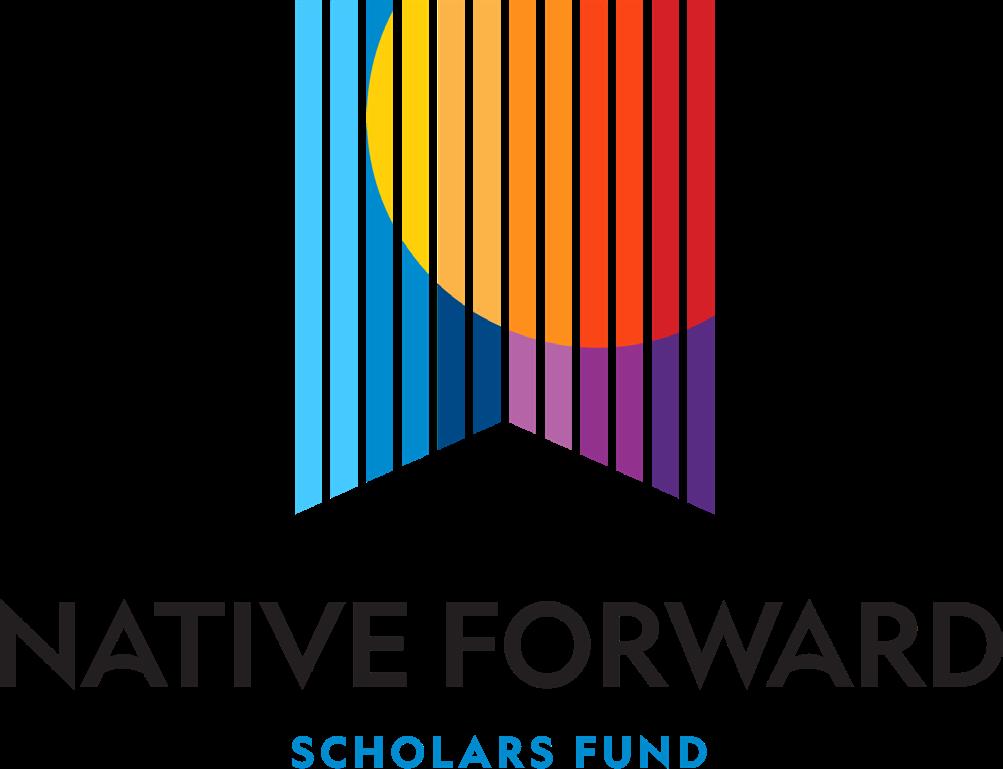Highlighting Native Voices Across Indian Country





Honoring Our Legacy: Native Forward Celebrates 50th Anniversary College Affordability for Indigenous Students







Honoring Our Legacy: Native Forward Celebrates 50th Anniversary College Affordability for Indigenous Students

Congratulations to our Cherokee Nation Delegate to Congress on her induction into the Native Forward Scholars Fund Hall of Fame.
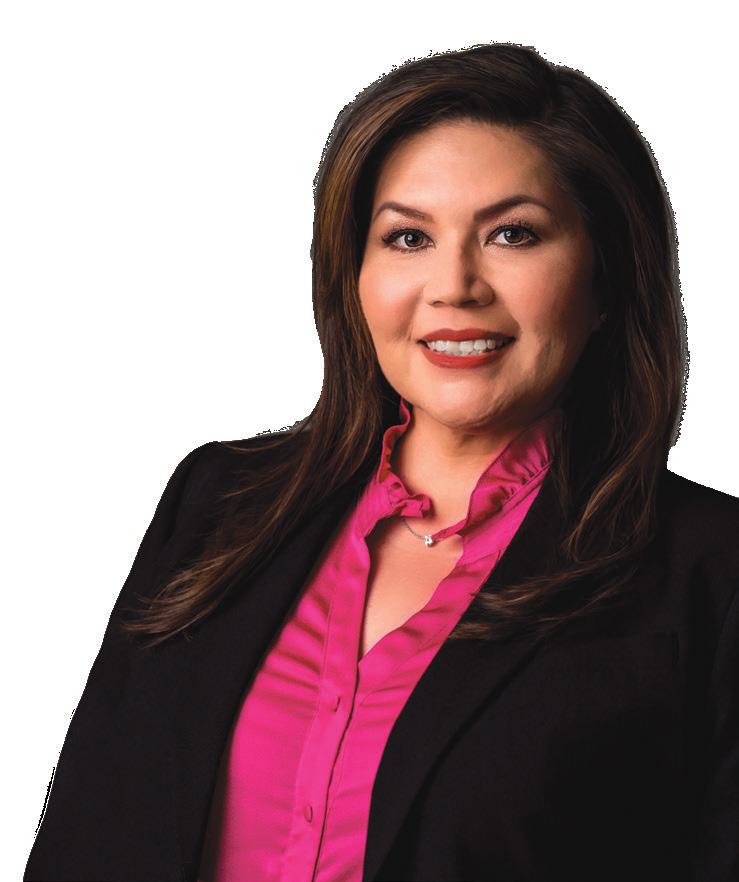
cherokee.org


The American Indian Graduate Volume 22, Number 1
10010 Indian School Rd. NE, Albuquerque, NM 87112
505.881.4584
www.NativeForward.org
STAFF
Publisher
Angelique Albert, CEO
Confederated Salish & Kootenai Tribes
Editor in Chief
Sara LaBarge
Menominee Nation
Managing Editor
Alyssa Bitsie
Navajo Nation
Graphic Designer
Britney A. King
Diné & Chippewa-Cree
Board Chair
Holly Cook Macarro
Red Lake Band of Ojibwe
Board Vice-Chair
Stacy Leeds
Cherokee Nation
Board Treasurer
Hud Oberly Comanche, Osage & Caddo
Board Secretary
Amber Garrison Choctaw Nation of Oklahoma
COVER IMAGE


Angelique Albert, CEO

Confederated Salish & Kootenai Tribes
Dr. Henrietta Mann
Cheyenne-Arapaho Tribes of Oklahoma
Kimberly Teehee
Cherokee Nation
Arthur Hafen
Taos Pueblo
Jesse Lemon
Taos Pueblo
Chairman Ernie Stevens Jr.
Oneida Nation of Wisconsin
SPRING 2023 | VOLUME 22 | NUMBER 1
04
CEO Message
Reflecting on Native Forward’s 50th Anniversary Gala
06
Chair Message
Continuing Native Forward's legacy for the next 50 years
18
The Rising Voice of Chenoa Scippio
10
COVER STORY
Native Forward celebrates its 50th Anniversary Gala: Honoring Our Legacy at the Smithsonian’s National Museum of the American Indian
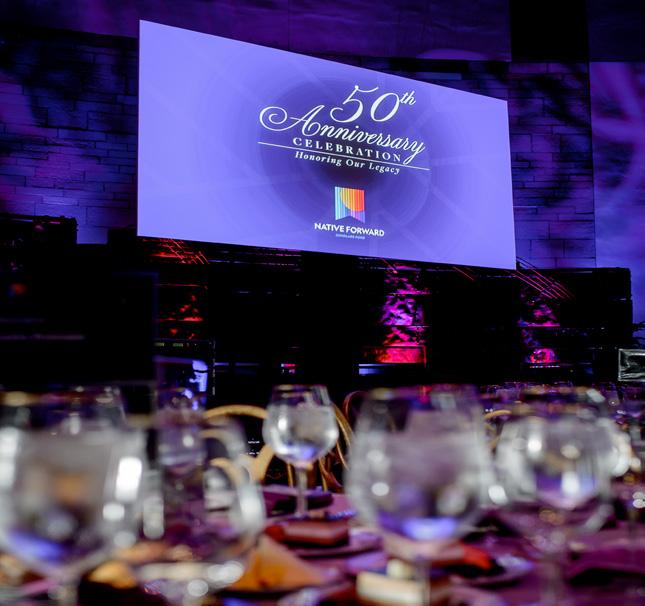

23
26
National Native Scholarships Providers: National Study on College Affordability for Indigenous Students
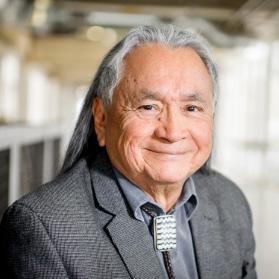
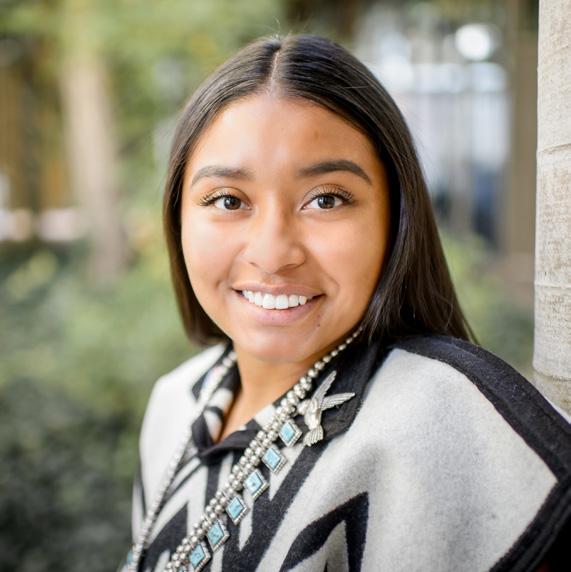



40
Native Forward at SXSW EDU
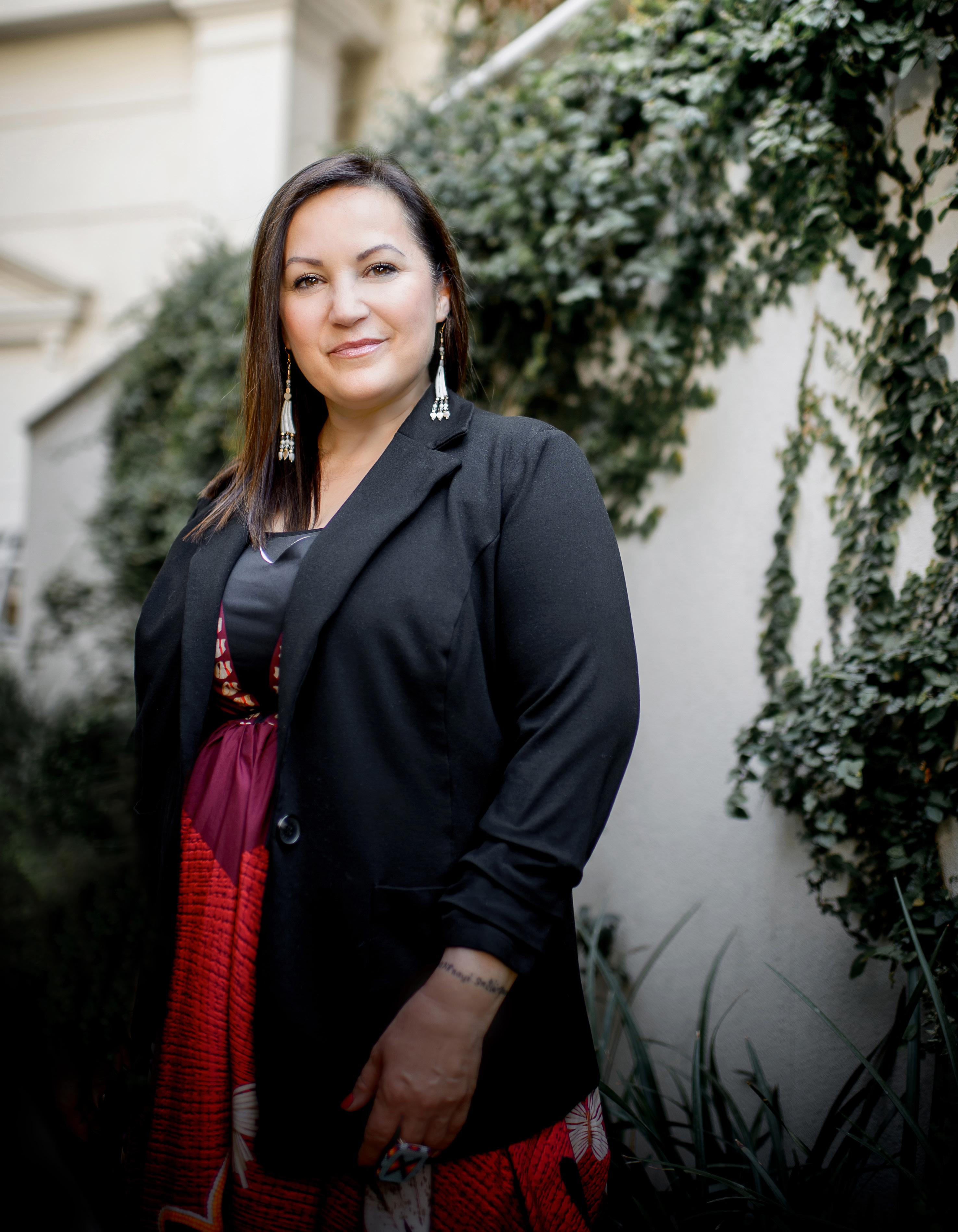 a message from chief executive officer
a message from chief executive officer

This spring edition of The American Indian Graduate magazine reflects on our 50th Anniversary Gala: Honoring Our Legacy that took place on February 22, 2023, in Washington D.C., at the Smithsonian’s National Museum of the American Indian. The momentous occasion brought together alumni and leaders throughout Indian Country to honor our visionary founders, Robert Bennett and John Rainer, our legacy, and those over the past 50 years who have been instrumental in bringing us to where we are today.
Our 50th Anniversary Gala highlighted the importance of scholarships and academic support for all Native students. I would like to thank all honorees, distinguished guests, Tribal leaders, sponsors, and partners for joining us in Washington, D.C. to celebrate over 50 years of impact. I am honored and grateful to serve with those who passionately work for Native scholars looking to advance their education and creating visibility to have true representation at many different levels.
Also in this edition, hear from alumni, scholars, and those making impacts for Indian Country through their own voices. Thank you to all who participated in helping us create a collection of inspiring and uplifting Native voices and your time spent on written words, interviews, and brilliancy. It is with
your voice and dedication that helps guide and inspire others to make lasting impacts for and in Native communities.
Lastly, at Native Forward Scholars Fund, our students are always at the center of what drives us. We invite you to join us for another 50 years of serving students in higher education by providing direct scholarships and support services to over 20,000 students from over 500 Tribes in all 50 states. Native Forward will continue to empower Native people and communities through higher education, resources, and advocacy. Here’s to the next 50 years!
Lemlmtš (Thank You),
Angelique Albert Chief Executive Officera message from board chair
Awarm welcome to the spring 2023 issue where we share a tremendous milestone in the organization’s history while also sharing Native voices and stories making differences across the nation.
Native Forward Scholars Fund recently celebrated its 50th Anniversary Gala: Honoring Our Legacy. The celebratory event honored and recognized the many who came before us and contributed to the success of Native Forward. Not only did we celebrate and connect with each other, we raised much-needed funding for Native scholars.
With generous donations from readers like you, Native Forward can continue to grow and blossom as the largest direct scholarship provider to Native students in the U.S. We witnessed an impactful night at our 50th Anniversary Gala from honoring our founders, previous board members, and staff members while highlighting the path to success in higher education for the Native scholars we serve.
I personally want to say ChiMiigwech, “big thank you” in Ojibwemowin, to all who have helped lay the foundation for the place we find ourselves today where scholarship support is available to all Native students seeking post-secondary degrees and for making our 50th Anniversary a special night to remember.
Also, in the pages of this magazine, you’ll find the stories of individuals who we feel carry on the legacy of Native Forward to help elevate Native voices. It is an honor to serve as the Board Chair and to witness the stories of so many who are committed to making Indigenous representation shine through. It is with this vision and eye of the next generations of Native scholars, that we are proud to be Native Forward. Miigwech for your continued support.
Sincerely,
Holly Cook Macarro Board Chair
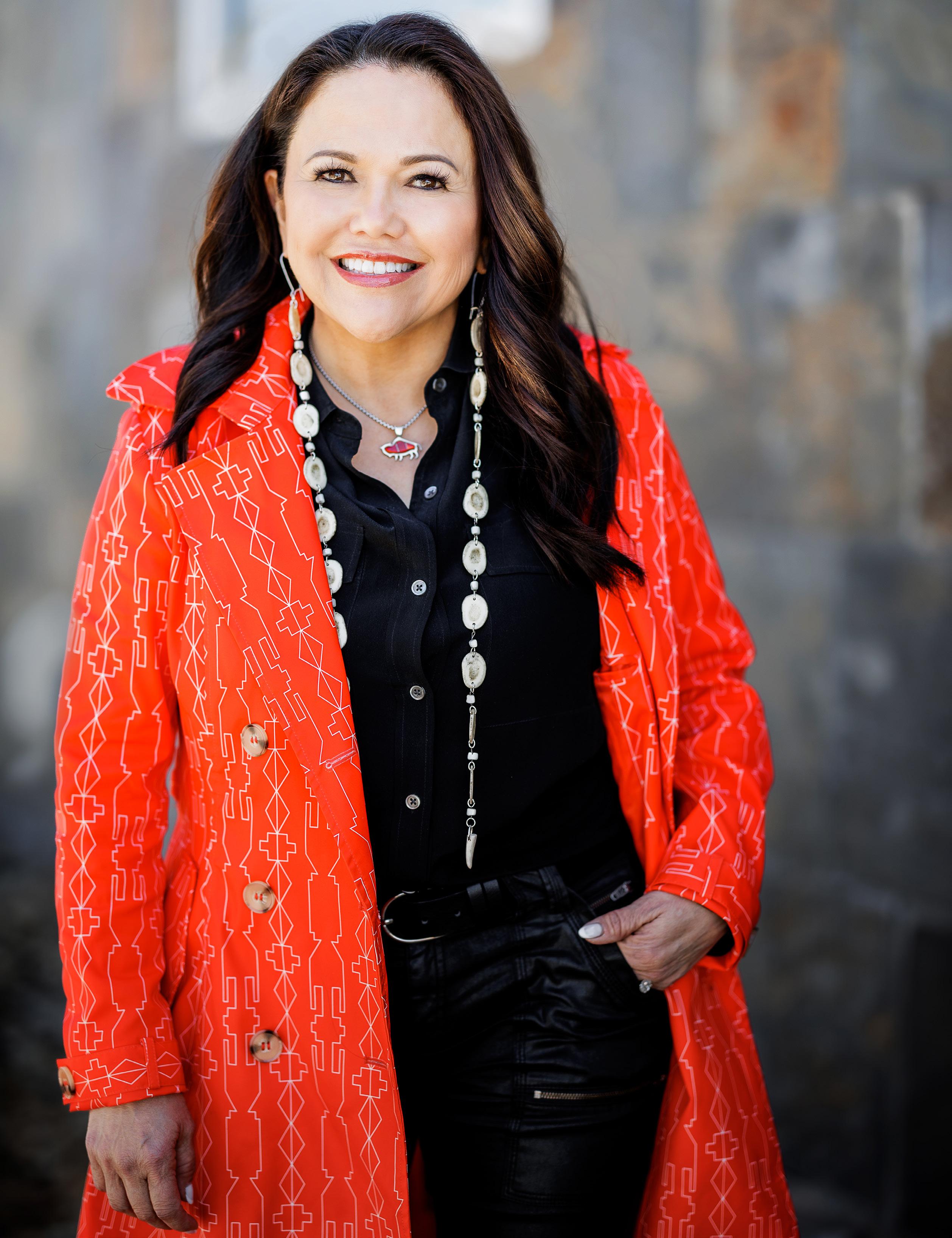
Diné
Native Forward Marketing & Communications Specialist
Alyssa is a copy editor and writer. She loves telling stories and bringing them to life through creative mediums for digital platforms. Originally from New Mexico, she earned her Bachelor of Arts in Journalism and Mass Communication from the University of New Mexico. She has expereince working in the news industry and served eight years in the U.S. Navy.
Diné
Native Forward Alumnus
Niya is a fashion journalist and multidisciplinary creative committed to elevating the discussion around the emerging field of Indigenous fashion and storytelling in the Americas and beyond. He attained his master’s degree in fashion journalism from the Academy of Art University in May 2020. He was also the former Director of Multimedia for Phoenix Fashion Week. He has years of fashion show production experience including mentoring up-and-coming designers and models. He is a citizen of the Diné Nation originally from Mariano Lake, New Mexico.
Yazmene Thomas, Ed.D

Native Forward Director of Student Programming & Research
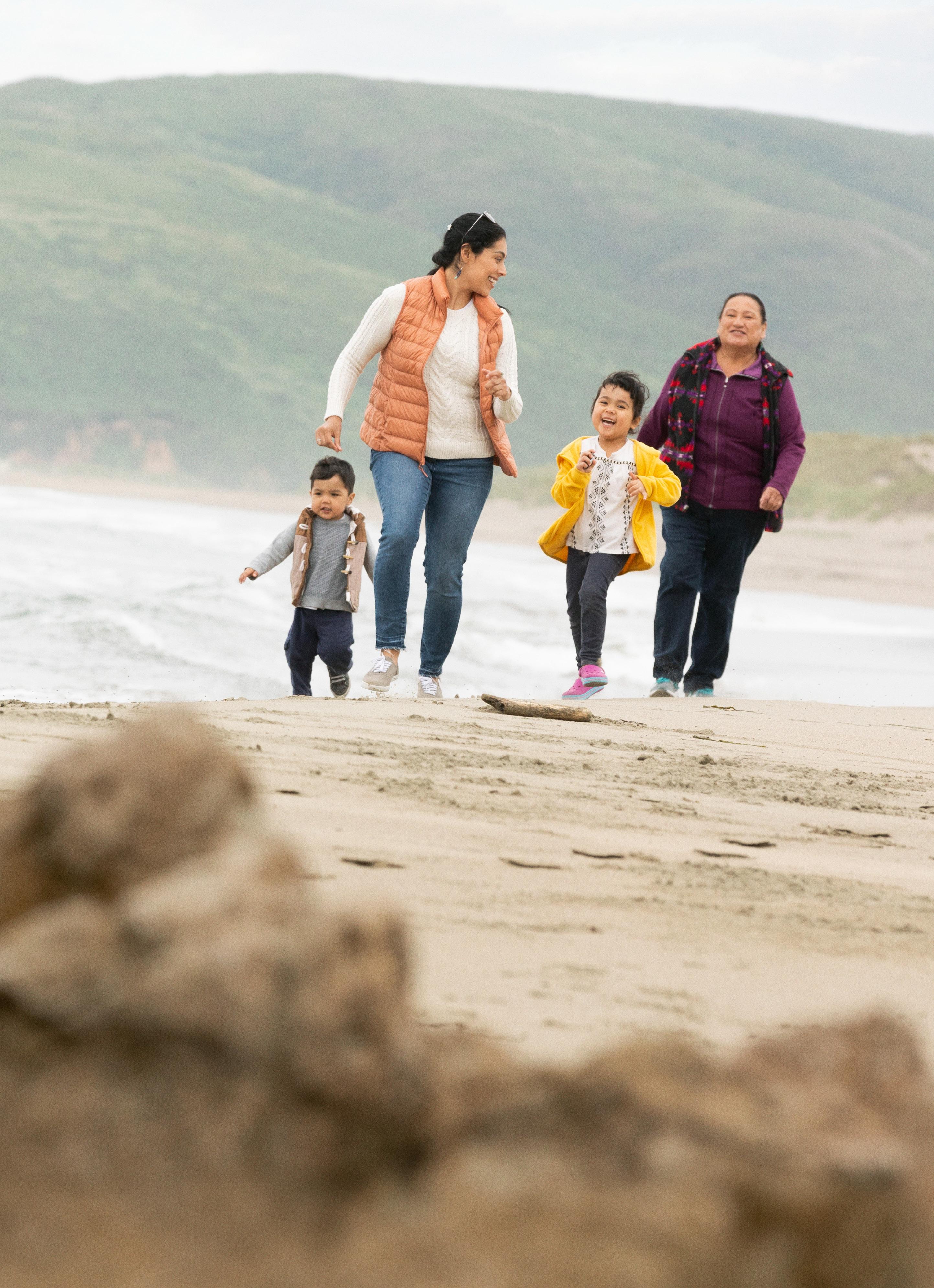
Dr. Thomas has over 20 years of planning and program development experience in education, adult learning, and organizational leadership. Her career in education spans from kindergarten to college with experience in classrooms and training rooms nationally and abroad. She attended the University of Wisconsin-Stout, earning both a Bachelor of Science in Psychology and a Master of Arts in Education with an emphasis in multiculturalism, and was conferred with her Doctorate in Educational Leadership Curriculum and Instruction from the University of Phoenix. Dr. Thomas uses her passion and curiosity about other cultures to frame her lifelong work in the field of education.
Michael Bird
Kewa Pueblo
Native Forward Alumnus and Former Board Member
Mr. Bird is the first American Indian and social worker to serve as President of the American Public Health Association in the organization’s history. He served in various capacities with the USPHS Indian Health Service for 20 years. He was Executive Director of the National Native American AIDS Prevention Center and was the first Native member of the National Policy Council at AARP, where he served for six years. Mr. Bird continues to be a member of the Health Advisory Committee for the National Collaborating Centre for Aboriginal Health in Canada. Mr. Bird earned a master’s degree in social work from the University of Utah, and a master’s degree in public health at the University of California, Berkeley. In 2018, he was recognized by the UC Berkeley School of Public Health as one of 75 Most Influential Alumni in the 75-year history of the school of public health.
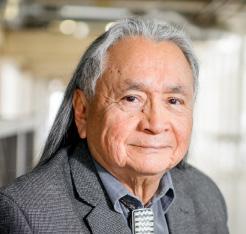
Navajo Nation
Native Forward Student Programming Manager

Daryan’s experience includes over three years of student mentoring, public advocacy, and research. She is highly motivated and invested in Tribal communities’ current and uprising generations. Originally from Shonto, Arizona, Daryan remains rooted in her traditional Navajo upbringing. She attended the University of Arizona, earning a Bachelor of Science in Psychology and American Indian Studies, and earned a Master of Professional Studies in Indigenous Governance with an emphasis on Indigenous education policy.
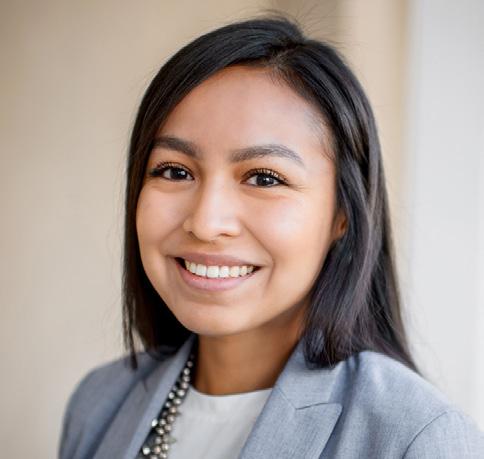
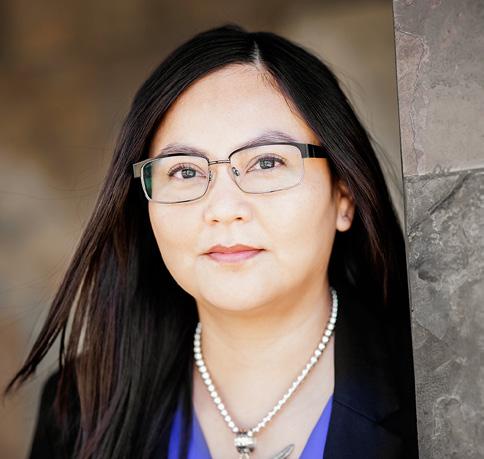
Our future is shaped by the decisions we make today. That’s why we’ve invested $50 million to serve the needs of Native American, Native Hawaiian and Alaska Native communities, from housing affordability and financial health to scholarships and small business support.

For over 60 years, we’ve been providing capital and financial services to Native communities and businesses and we’ll continue to work together to make better tomorrows for generations to come.
Find out more at wellsfargo.com/nativecommunities

Native Forward Scholars Fund Celebrated its 50th Anniversary in Washington, D.C., at the Smithsonian's National Museum of the American Indian on February 22, 2023.
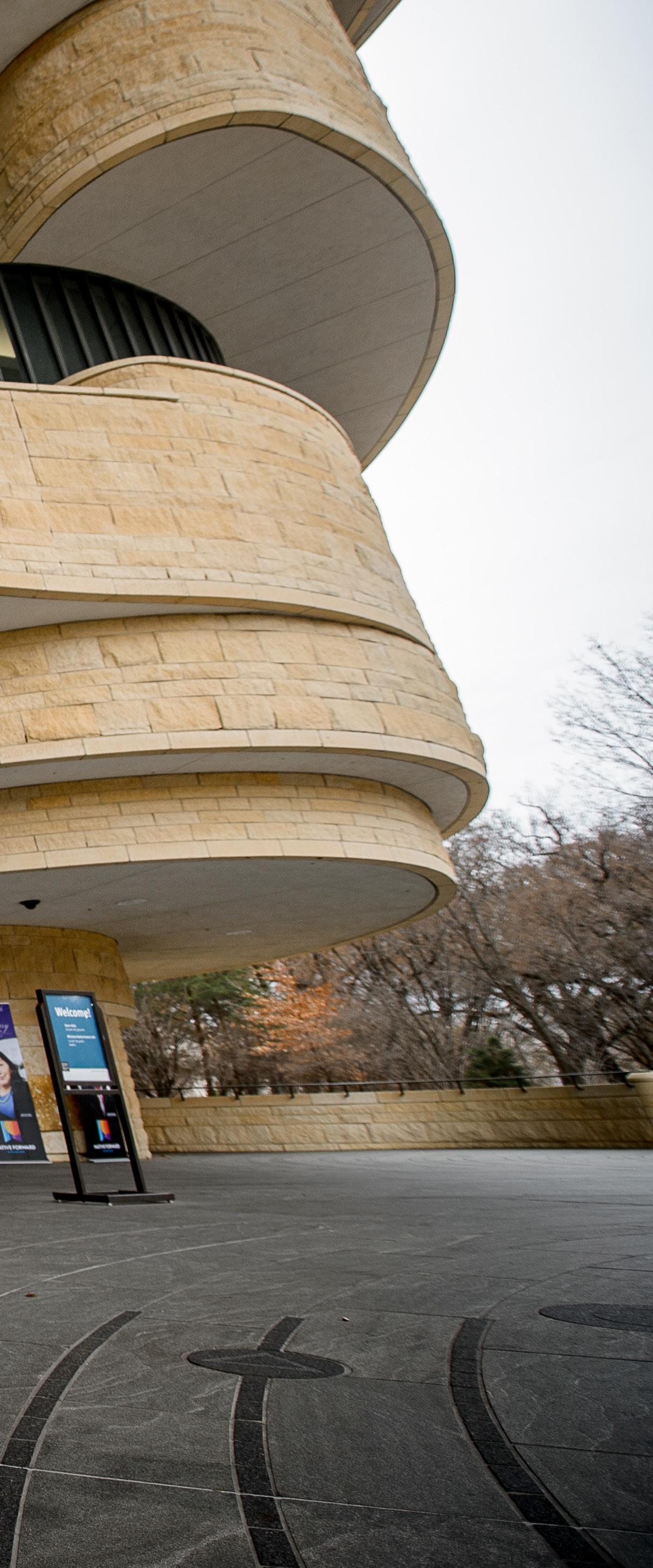 by Alyssa Bitsie
by Alyssa Bitsie
Initially scheduled for 2019 but delayed due to the COVID-19 pandemic, the historic anniversary event honored the legacy and story that began more than 50 years ago. The special evening was dedicated to founders, Robert Bennett (Oneida) and John Rainer (Taos Pueblo), inaugural Hall of Fame inductees, and those who continue to make impacts in and for Indian Country.
Some notable guests in attendance were Motivational Speaker Chance Rush (Hidatsa, Arapaho, Dakota, Oneida, Otoe), DJ Emcee One (Citizen Potawatomi
Nation), and Author Angeline Boulley (Sault Ste. Marie Tribe of Chippewa Indians). Opening the gala with a prayer song was Shawn Ironmaker, who is an enrolled member of the a’aniiih (Gros-Ventre/White Clay) People. He is also a descendant of Nakoda (wakpa wicasa/Stoney) and Rocky Boy Cree/Pembina Chippewa from the Fort Belknap Indian Community.
Native Forward CEO, Angelique Albert, highlighted the early origins of Native Forward when Bennett and Rainer first conceptualized the idea of the organization during the end of the Federal Boarding School Era and near the beginning of the Self-Determination Era.
“There was a point where they decided it was difficult to penetrate political barriers and it was difficult because we needed highly educated and highly skilled Native people in positions of power and influence,” Albert said.
The Gala also inducted influential Native leaders – the first three of whom are Native Forward alumni and scholarship recipients – into its Hall of Fame. The Class of 2023 includes Alumna, Honorable Deb Haaland (Laguna Pueblo), Board Member and Cherokee Nation Delegate to U.S. Congress, Kim Teehee (Cherokee Nation), Academic, Activist, and "the Native Maya Angelou,” Dr. Henrietta Mann (Cheyenne—Arapaho Tribes of Oklahoma), legal advocate, former Commissioner of Indian Affairs, and Native Forward co-founder, Robert Bennett, and former Executive Director of National Congress of American Indians and Native Forward co-founder, John Rainer.
“We have magnificent histories, and we are taught by our beloved grandparents and ancestors that education is exceptionally important, we created the first educational systems of America. We are its first teachers.

We have always valued education and today there are some of those that call education our new buffalo. I wish to thank Native Forward for assuming the responsibility of providing our beloved students with the critical financial needs to pursue higher education.”
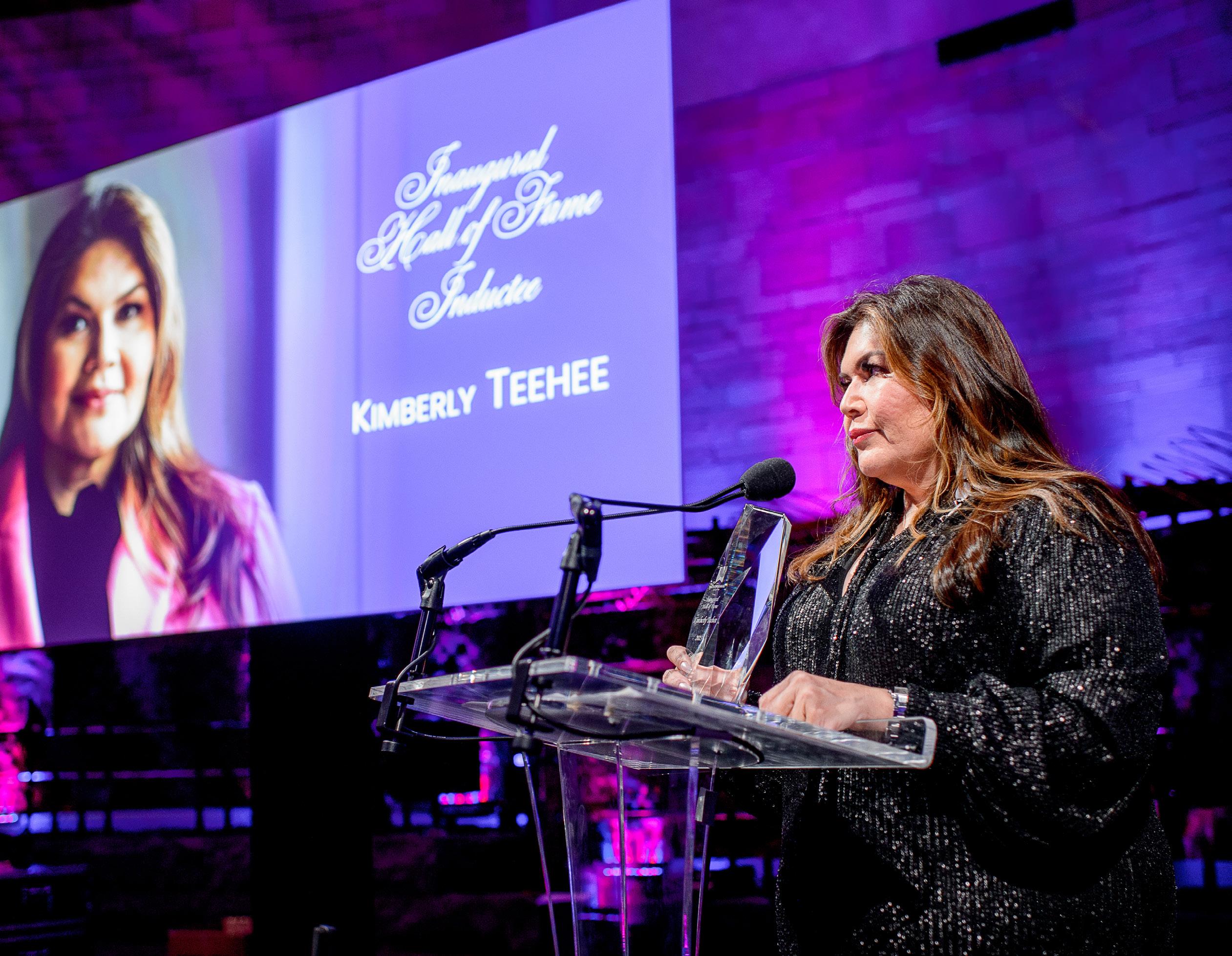 Native Forward Scholars Fund's Board Member at Large, Kimberly Teehee (Cherokee Nation), speaking after her induction into the Inaugural Hall of Fame Class of 2023 at the 50th Anniversary Gala in Washington, D.C., at the Smithsonian’s National Museum of the American Indian on February 22, 2023.
Native Forward Board Member at Large, Kimberly Teehee (Cherokee Nation)
Native Forward Scholars Fund's Board Member at Large, Kimberly Teehee (Cherokee Nation), speaking after her induction into the Inaugural Hall of Fame Class of 2023 at the 50th Anniversary Gala in Washington, D.C., at the Smithsonian’s National Museum of the American Indian on February 22, 2023.
Native Forward Board Member at Large, Kimberly Teehee (Cherokee Nation)
“Education has always been critical to what we do as a nation. I think back to my own parents’ journeys – they both grew up in Cherokee speaking homes; they're first language Cherokee speakers. They’ve lived through a lot of federal policies, relocation, boarding schools, and such. They struggled to go to school.”

“I know I’m one person but across the country. Having the support for our education, for higher education, means the world to our country, to our communities, and to the people who need to come after us.”
Honorable Deb Haaland (Laguna Pueblo)

“My value system includes perseverance. The kind of perseverance it takes to finish a degree. What kind of perseverance must John have had to go through all of his struggles? More recently, the legacy we’re left with is that it’s important to find ways to keep educating ourselves like John would and like John did.”
Grandsonof John Rainer Sr., Arthur Hafen (Taos Pueblo)
“He was steadfast in his belief that education was key to power and freedom.”
Granddaughterof John Rainer Sr., Jesse Lemon (Taos Pueblo)
Throughout the evening, guests took part in a silent auction on items from various artists including Bethany Yellowtail (Crow Tribe), Maka Monture (Tlingit and Mohawk), Darrick Tsosie (Jemez Pueblo), Traci Rabbit (Cherokee Nation), Regina Shebala (Navajo), Darlene Cronin (Navajo), Walter Lamar (Blackfeet & Wichita), Eric Tippeconnic (Comanche), and Dante Biss-Grayson (Osage).
The historic anniversary event was successful in highlighting our founders while also keeping Native
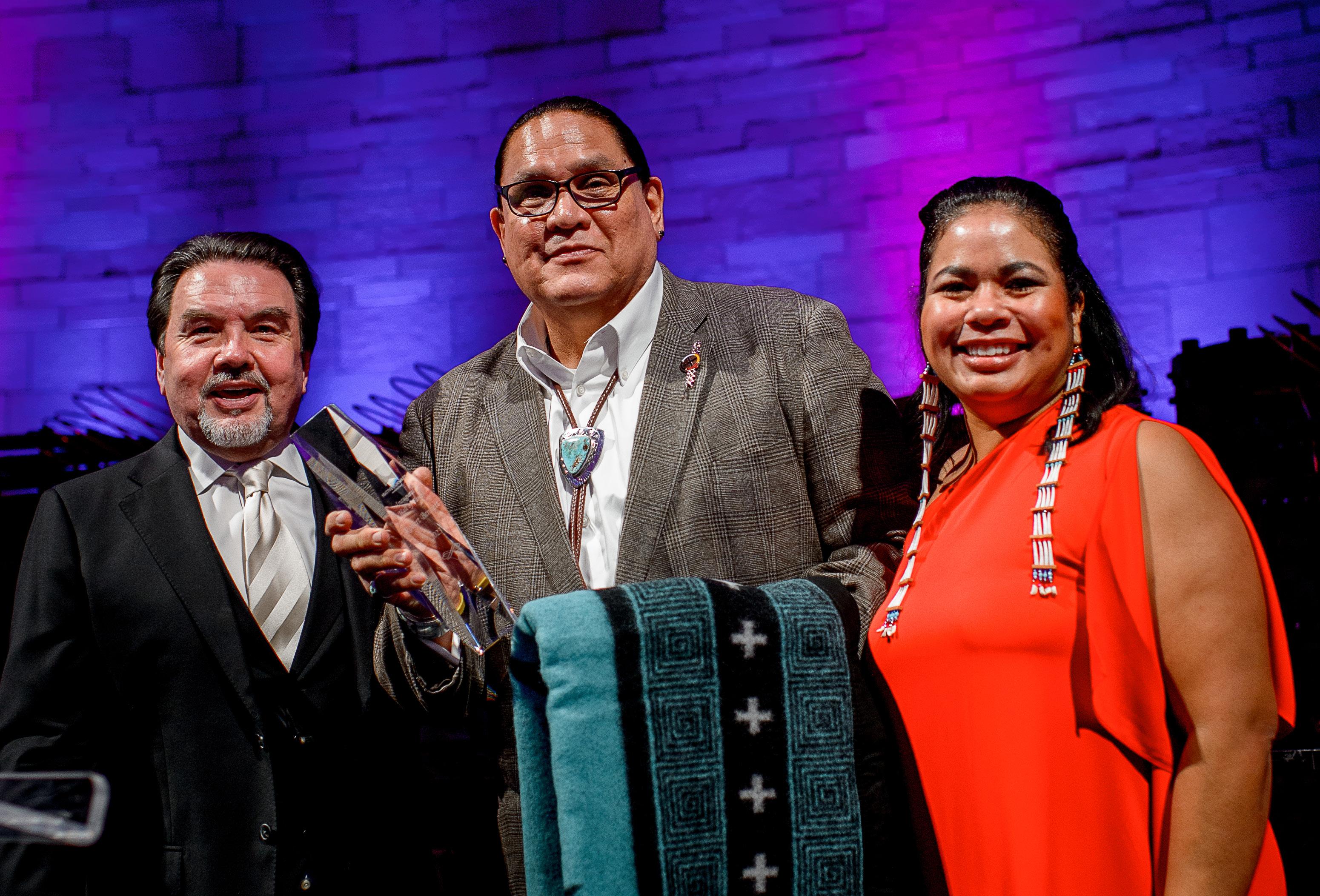
Forward’s mission apparent. Founded on the belief that all Native people deserve higher education; the legacy of Native Forward’s founders continues today and has grown to become the premier national resource for funding that continues to empower generations of Natives across all sectors.
If you’re interested in making an impact in Native higher education, please visit www.nativeforward.org/ donate-now.
“These people had education in their hearts first and I think it’s really important to see what Mr. Bennett set out to do. He set out to change the world in education for all of Indian Country and he did that.”Native Forward Board Member at Large, Chairman Ernie Stevens Jr. (Oneida Nation of Wisconsin)
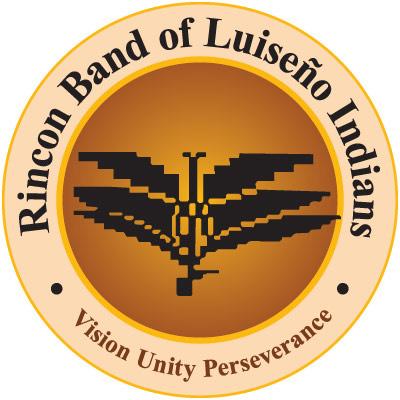

Albuquerque Branch Wells Fargo
Albuquerque Community Foundation
American Indian College Fund

American Indian Science and Engineering Society (AISES)

Bethany Yellowtail
Darlene Cronin
Darrick Tsosie
Eighth Generation
Elite Island Resort
Eric Tippeconnic
Aspen Printing Company
Big Fire Law & Policy Group LLP
Corina Horn
Indigenous Education, Inc. (IEI)
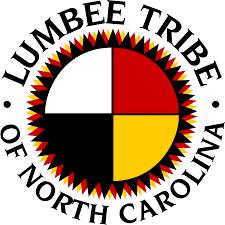

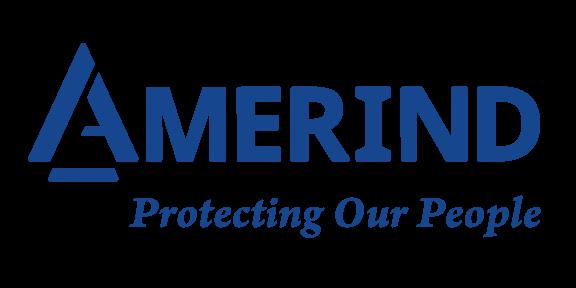
Indian Gaming Association (IGA)
Native News Online
Joseph Kayne
Maka Monture
NIKE N7
Origins
Regina Shebala
Sky-Eagle Collection
Richard Ricks
S&K Technologies, Inc.

Tim LaFrance
U.S. Eagle Federal Credit Union
Tanaya Winder
Traci Rabbit
Walter Lamar
Wells Fargo

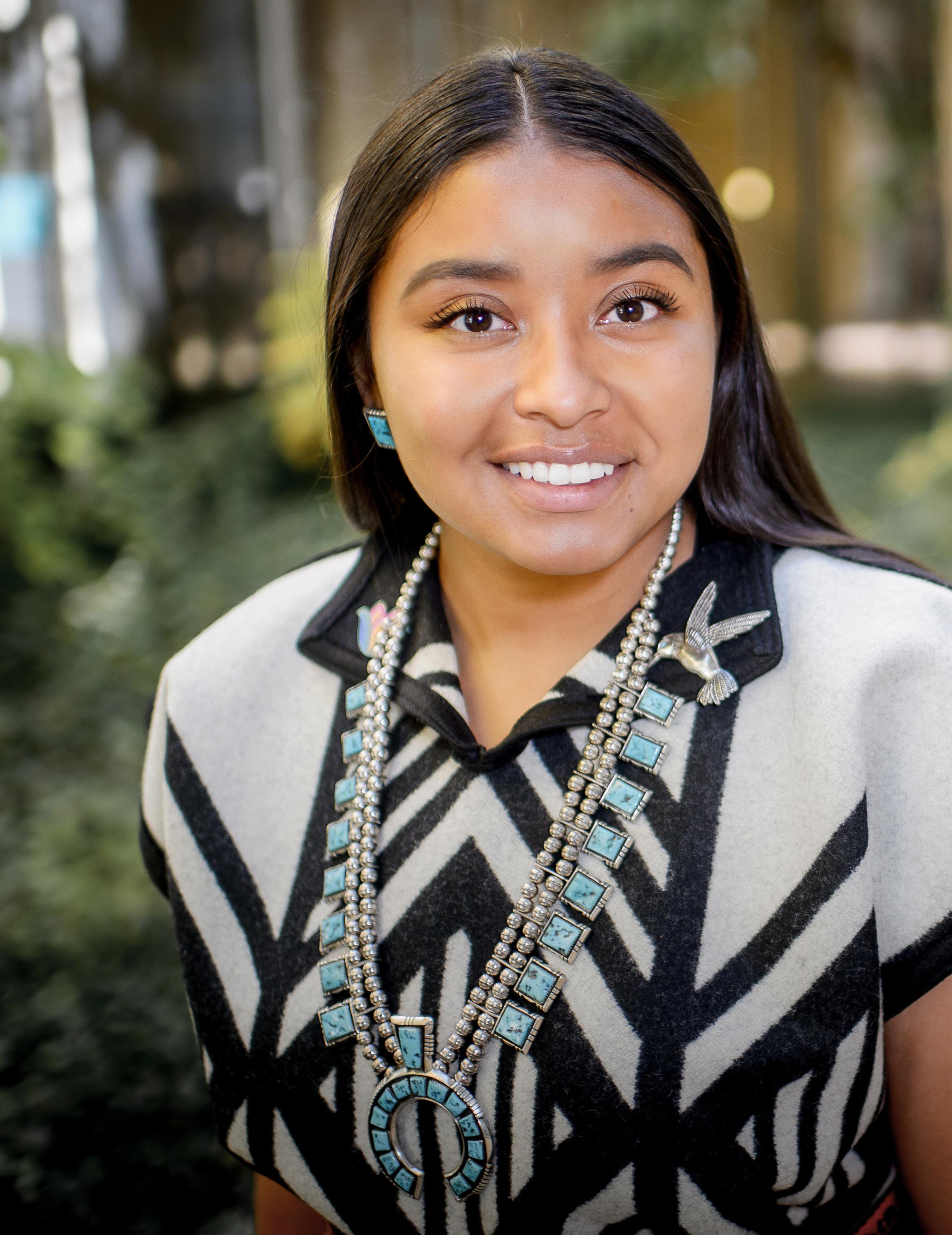
Growing up in the Diné Nation and the Santa Clara Pueblo community, Chenoa Scippio (Diné & Kha'p'o Owingeh) did not consider herself a leader. As the only Indigenous person at a predominantly White institution at Harrison High School in Colorado Springs, Colorado, Scippio was also the youngest player on the junior varsity basketball team. Like most Indigenous youth occupying White spaces, Scippio felt isolated and disconnected. As she puts it, she was "just going with the flow and trying to have fun."
One day during her sophomore year, her coach approached her and said, "I have decided to make
you team captain. It is time for you to step up and lead this team.” This request by her coach left her dumbfounded.
“In my head, I was like, ‘Oh, my God! People want me to lead?’ Because up to that point in my life, I had only ever seen White people lead,” she confessed. “I’m definitely not White, and you know, some of their ideas and values didn’t match my own.”
After a slight moment of apprehension and selfreflection, Scippio decided to answer the call, and almost immediately, she began to excel in school and other sports.
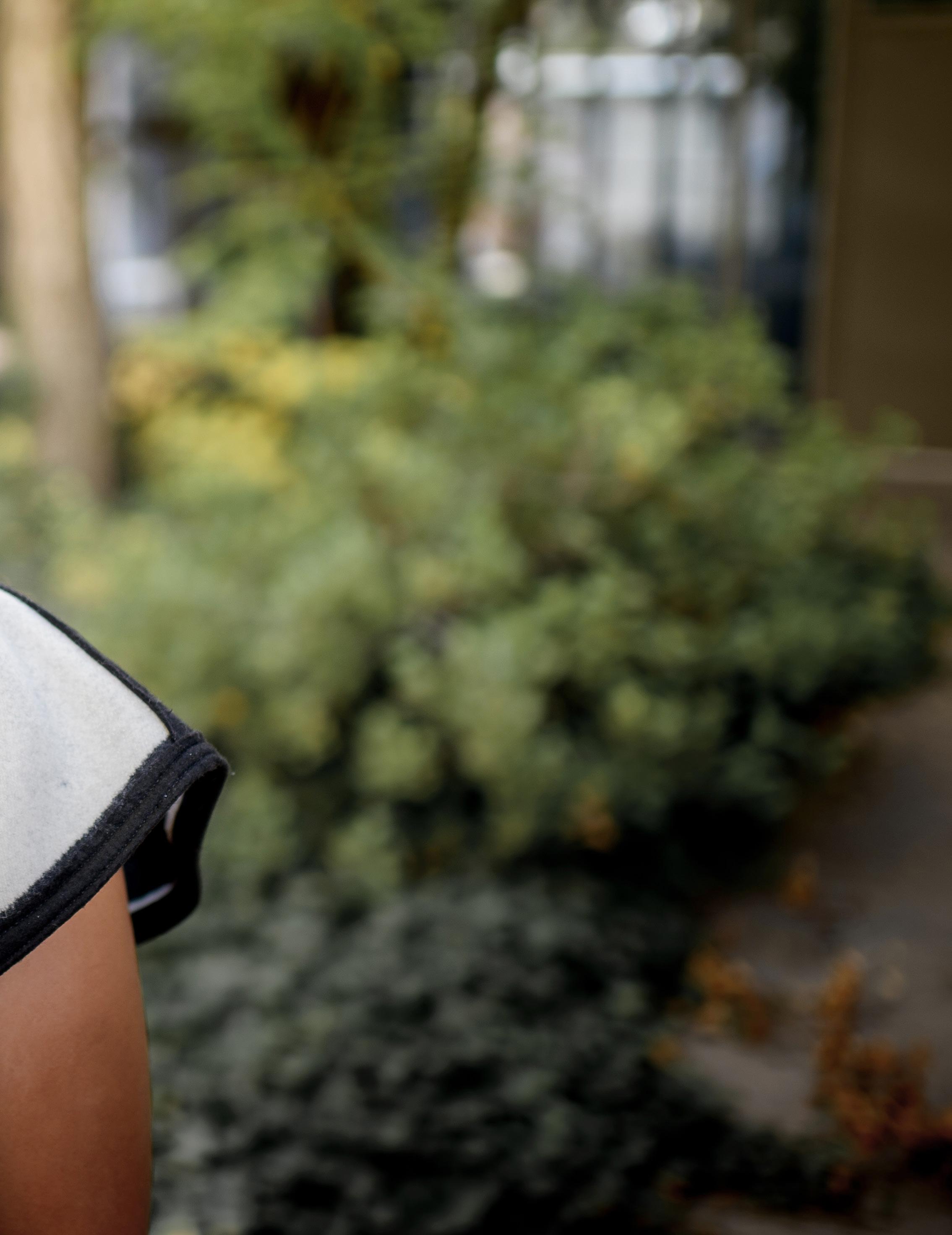
With the help of the Wells Fargo Scholarship for Undergraduates and Native Forward Direct Scholarship, the Native Forward alumna is a graduate of the University of New Mexico, where she earned dual bachelor's degrees in Population Health and Native American Studies.

According to Scippio, population health is like public health but focuses on a specific community. “The goal of population health is to understand the needs and wants of a community so that leadership can implement healthy programs that allow the community to thrive,” she said excitedly.
While most health professionals and leaders focus on an Indigenous community’s deficits – poverty, alcoholism, diabetes, high suicide rate, and so forth – Scippio prefers to analyze a community from a strengths-based approach, but more importantly, from an Indigenous point-of-view. “When outsiders visit my community, they are quick to point out the random positioning of homes and buildings or the lack of infrastructure. They
say it all seems random.”
“Not to me!” she said with determination. “If I were to draw you a map of my community, I could tell you why a medicine person lives here, why our church and elementary school is built here and there, why clusters of families live so close together. It’s not random; it’s just a different type of community that functions in another way.”
As an emerging community advocate and organizer, Scippio currently serves as co-president for the United National Indian Tribal Youth, Inc. (UNITY) executive team and is a member of other prominent youth organizations, including the Native Organizers Alliance and the New Mexico Indigenous Youth Council.
As co-president of UNITY, Scippio leads a team to execute the national organization’s mission, which is “to foster the spiritual, mental, physical, and social development of American Indian, Native Hawaiian, and Alaska Native youth, and to help build a strong,
unified, and self-reliant Native America through greater youth involvement.”
Indeed, her involvement with UNITY has only catapulted her professional growth and undoubtedly shaped how she uses her voice: “Having a voice means being a good representative of my family and community. It’s about being a good relative.”
In recent years, Scippio’s generation, known as Gen Z, has been making their voices heard through social media and in the political sphere at large. They have protested guns and advocated for the rights of marginalized communities. More specifically, they have raised awareness for climate change. In a sense, they have indigenized their minds.
To be a good relative is a pan-Indigenous concept that encourages Indigenous people to champion themselves, their communities, and their future ancestors, whether culturally, emotionally, mentally, or spiritually.
It is incumbent upon Native people to always treat every living thing, animate and inanimate, with the utmost respect. Across Native homelands, the youth has taken on this mantra by committing to causes of their own, including land back environmentalism, tribal sovereignty protection, positive representation in media, and the Missing and Murdered Indigenous Persons (MMIP) crisis, to name a few.
“Having a platform like UNITY allows me to advocate for Indigenous issues. It allows me to stay connected with my culture and its history, and I want to carry on the values of my people for future generations,” said Scippio.
Like most Indigenous people, Scippio hails from a Diné matriarchal society where women take the lead, so she credits the women in her life, particularly her great-grandmother, for teaching her to become the leader she is today.

“My greatest mentor was my great grandma. I am blessed to say that she was in my life for 22 years, and not many people are able to say they know their great grandma. To be able to sit down with her, have conversations, and learn from her. She was my first teacher,” Scippio said.
Despite having a voice, not everyone was ready to listen. As president of the University of New Mexico’s Kiva Club, the university's oldest Native American student organization founded in 1952, Scippio and her peers challenged the university's lack of diversity, equity, and inclusion awareness and the systemic racism it perpetuates regarding its Native student body.
“Right before the pandemic, the Kiva Club put together a list of demands we wanted the university to address. They included asking the school to increase Native representation on campus, remove racist imagery in Zimmerman Library, or rename buildings that glorified the history of Spanish conquistadors. You know, colonizers who committed mass genocide against the Indigenous populations of New Mexico and across the Southwest,” Scippio said.
Ultimately, the university only addressed two minor issues on the organization’s 11-item list, which Scippio feels wasn’t enough. Still, she remains hopeful that change is on the horizon. “I feel like we, as Native people, are always repeating ourselves when it comes to fighting
for our rights. It is an ongoing battle, and at times, it can be quite exhausting, but I will continue to face these issues head-on," she said.
As for the future? Scippio has not quite settled on a dream job just yet. “I have advocated for my community for so long that it doesn’t feel like work anymore. It just comes naturally to me. Because of that, I haven’t been able to put a title on my dream job because I haven’t created it yet. It is still out there waiting for me to claim it,” Scippio said.
As for her advice to the next generation of Native scholars? “If you encounter something that makes you uncomfortable, lean into it. Most likely, it is going to become your passion.”
Chenoa Scippio
"Having a voice means being a good representative of my family and community. It's about being a good relative."


We share many common goals with our neighbors such as a desire to improve quality of life, contribute to economic vitality, and simply do more for our communities. From creating new jobs to contributing millions in charitable giving, the work Poarch does brings into focus a deeper truth—that good will and a strong community can help build a better world for all.
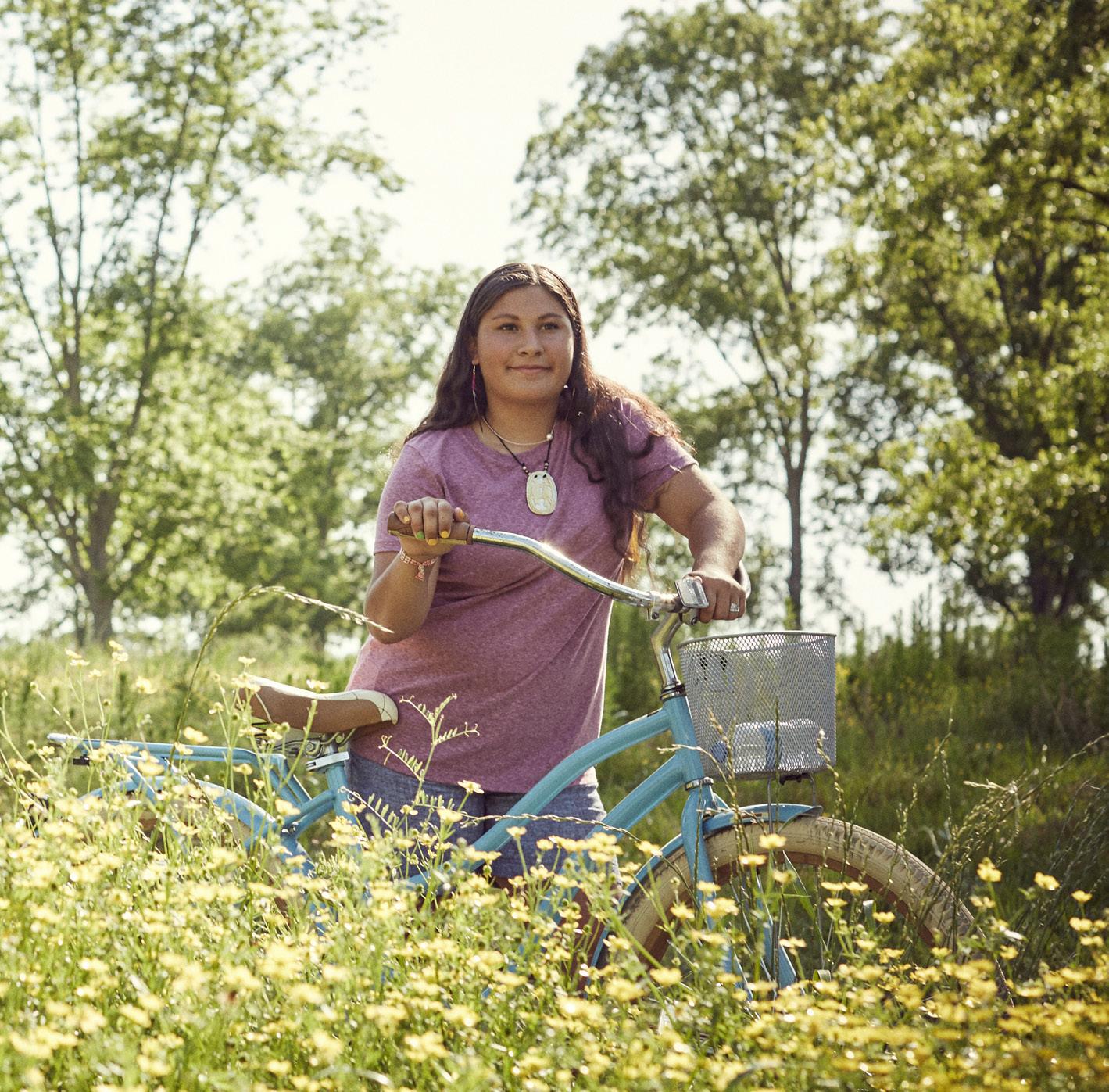


I come from a family that has had its share of challenges. Alcohol and substance abuse has been a big part of our history. We were relocated for a period in the 1950s, part of the Bureau of Indian Affairs Indian Relocation Program, depriving us of our land and culture. Racism has significantly impacted my life and world view. Fortunately, I had a loving and supportive mother as well as other family members who were encouraging and present throughout my life, positive influences in my life’s journey.
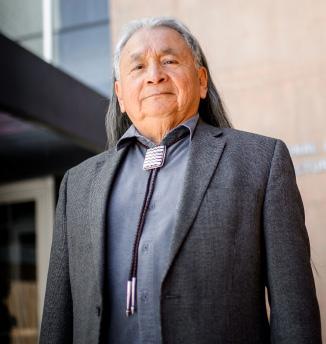
The other significant ongoing challenge has been racism from a nation that has yet to acknowledge the true history of its first moral sin--the genocide of over 80 to 100 million Indigenous people in the Americas. We continue to be marginalized, ignored, and have an invisible status unlike other communities of color or recent immigrant populations. As to my connection with Native Forward, I served on the board of directors from 2008 to 2016. During my last year, I served as president of the board during a transitional period and a change in organizational leadership.
I believe that my choice of a career in social work and public health was shaped by my lived experience in my family of origin and childhood. I felt that given what I experienced, I had an inside track to understanding what it was like to grow up in a set of less-than-ideal circumstances, now commonly known as ACES (adverse childhood experiences). Not everyone goes through this, although I came to understand that Native communities were experiencing more than our fair share.
At that point in time, the root causation and historical structural factors were not widely understood nor part of the science, much less application of appropriate cultural interventions. We were being blamed for our circumstances, i.e., poverty, poor health, and social condition. The nation at large failed to recognize that we had fewer options as Native people, given the preexisting historical context of disenfranchisement.
Going back, I think I would have told my younger self to be open to exploring my personal issues more openly, given the means that might have been available (counseling, therapy, etc). One cannot separate the personal from professional development and success. They need to work together in much the same manner as a bird’s wings that give it flight and allow it to soar. The
only failure in life is failing to learn from our experiences; We should not be afraid. We also should be willing to seek out mentors from our communities as well as others who might offer support and encouragement. In my day, there were fewer Native professionals, and less acknowledgment of multicultural values and the importance of respectful engagement with Indigenous communities.
Serving as president of the American Public Health Association (APHA) was one of the best things personally and professionally that ever happened to me. It opened the nation and world for me and provided an alternative to having to conform to operating in a historically colonial bureaucratic system. It provided me with the opportunity to enhance my personal and professional network, and to have experiences that likely would not have occurred otherwise. The other, more important opportunity was to leverage and introduce Indigenous thought, experiences, and professionals to the country and world. The lesson for me was to take risks and be willing to get out of my comfort zone. Sometimes you just have to jump!
The APHA is the largest, most diverse organization in the world with 50,000 members. In 2001, I served as the first, and sadly to date, only American Indian president in the organization’s history (still some work to be done). We do, however, have an AI/AN/NH caucus that was established in 1981 and celebrated 41 years in November. The caucus provides support and entre to the organization as well as student scholarships and a broad network for public health professionals.
I very much appreciated the opportunity to share my knowledge, experience, and professional relationships with Native Forward. I’m grateful for the knowledge and wisdom that other board members shared in our deliberations, always mindful of the goals and measures of success for the organization. It is important to ensure that all Tribes, nations, and Pueblos are represented and that we maximize the expertise of our growing network of professionals and community.
We all know what we know, but it’s what we don’t know that limits our success. Better to be broad versus narrow, inclusive versus exclusive, and diverse in every measure. I respect knowledge and intelligence for what it is, but I’ve learned that there is something else worth seeking: wisdom.
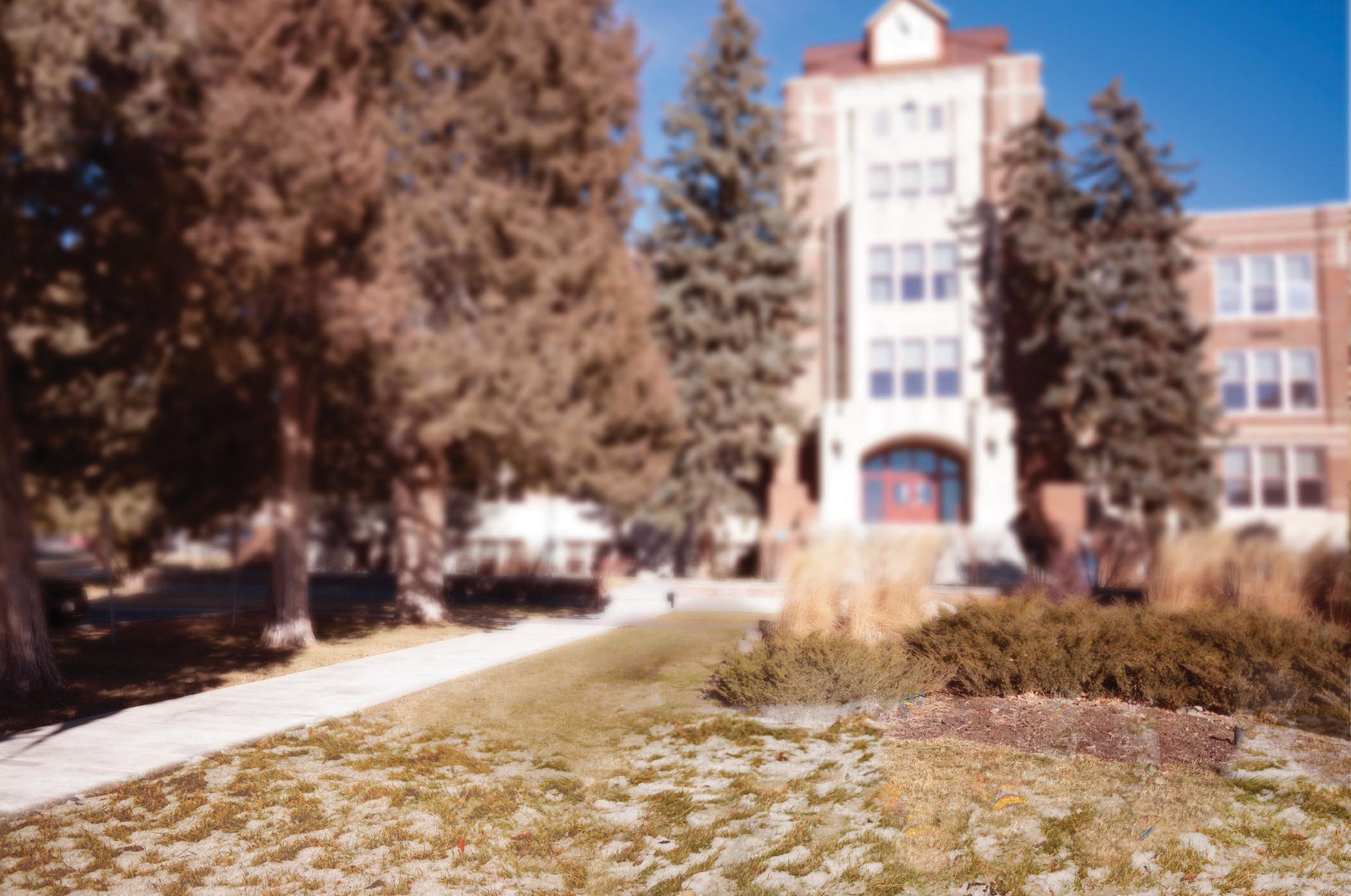
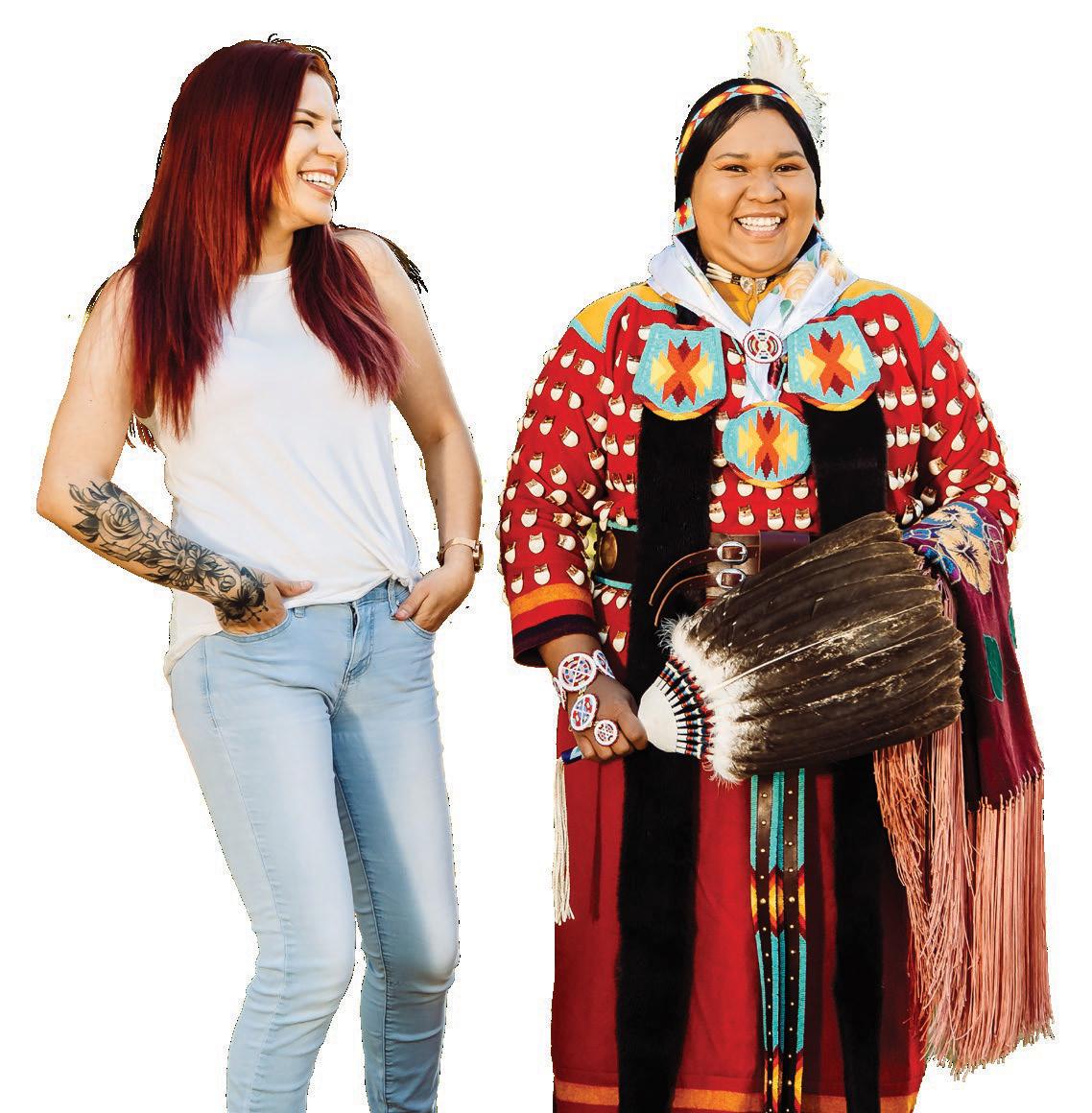



If you're a scholar of Native Forward, you could be our next Student of the Month!

Our Student of the Month, Making the Grad Campaign, highlights the outstanding accomplishments of our scholars in academic excellence and community engagement.
Apply today: www.nativeforward.org/student-of-the-month
SCAN TO APPLY FOR STUDENT OF THE MONTH

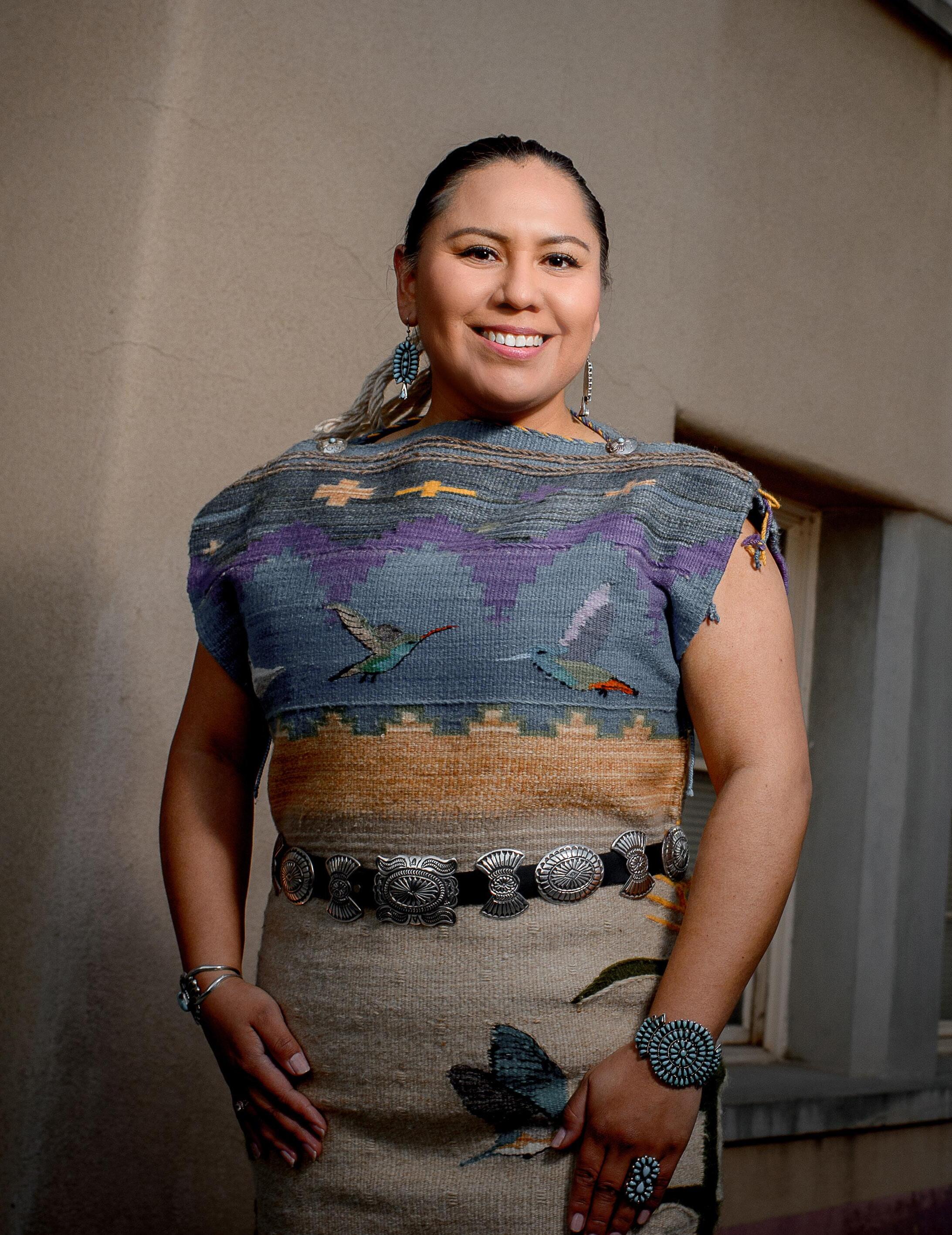 Sunnie Clahchischiligi, Navajo Nation, Native Forward Scholars Fund Alumni
Sunnie Clahchischiligi, Navajo Nation, Native Forward Scholars Fund Alumni
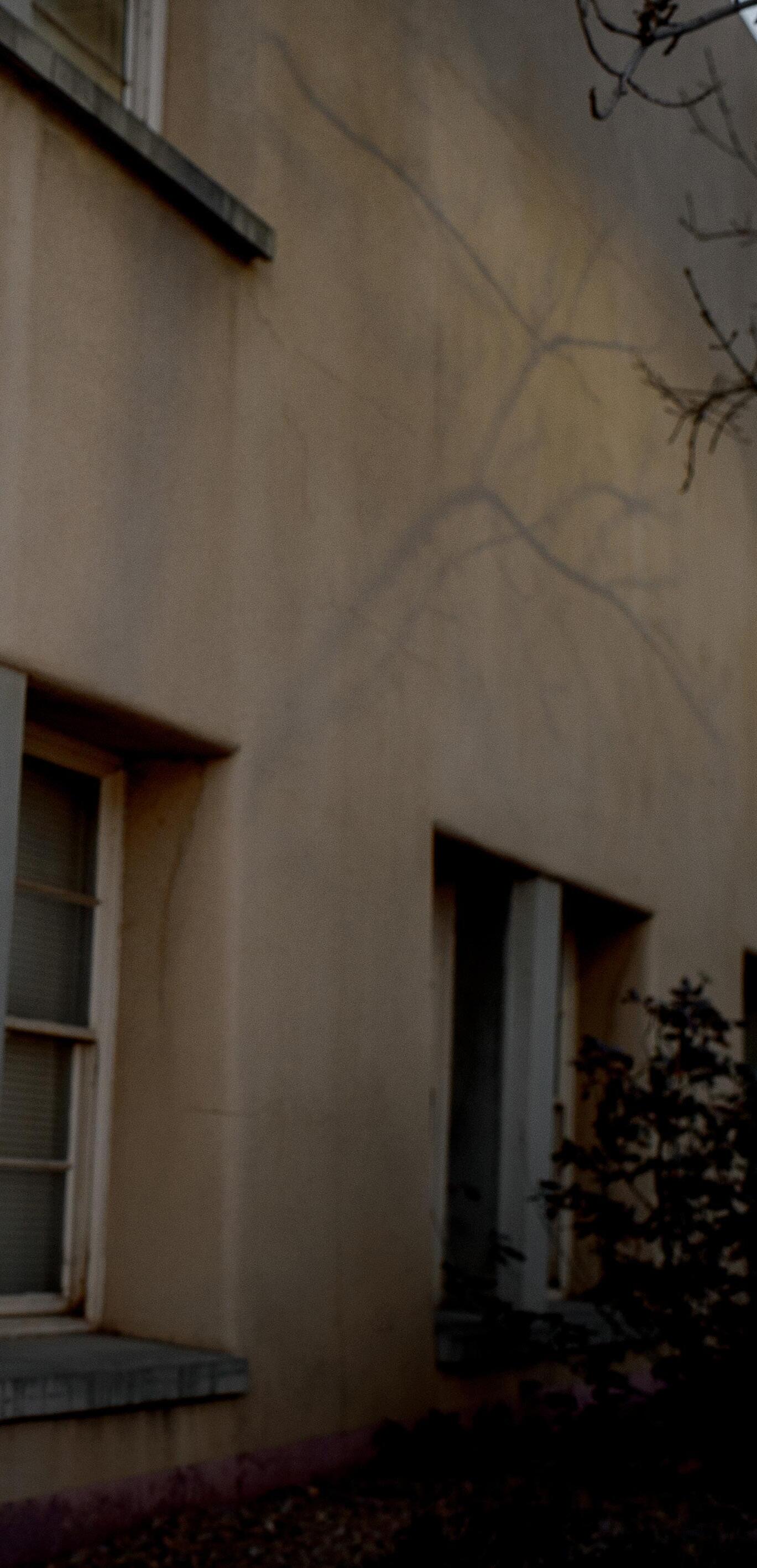
First-of-its kind collaborative research will increase Indigenous student visibility in higher education while informing effective practices of student support to increase student achievement.
Last year, the National Native Scholarships Providers (NNSP) released a National Study on College Affordability for Indigenous Students. The research and report, which were funded by a grant from Lumina Foundation, are the result of a collaboration of collection, data-sharing, analysis, and reporting between four Native scholarship providers: the American Indian College Fund, the Cobell Scholarship, the American Indian Science and Engineering Society, and Native Forward Scholars Fund.
Research staff from the NNSP organizations served as coprincipal investigators for the project and had support from Indigenous research faculty nationwide. The study is divided into subject-matter sections that include demographic and background data, Tribal affiliations, navigating personal finances to pay for education, financial aid and Free Application for Federal Student Aid (FAFSA) completion, and debt accrual. The study also includes an analysis of variables on affordability, such as food security, caretaking responsibilities, cultural experience, availability of off-campus housing, being the sole source of a family’s income, and more.
The National College Affordability Study for Indigenous Students gathered quantitative data on how Indigenous college students experience facets of funding their college education. However, the significance of the data not only confirmed anecdotal experiences, or insights into Indigenous college
student finances, but the key findings created a space for Indigenous student voices to be seen and heard.
Voices were sought from 5,231 current NNSP scholarship recipients receiving a 30.7% (1,607 responses) response rate. Likewise, at the time of survey distribution, 6,785 former NNSP scholarship recipients were also asked to complete the survey receiving a 17.4% (1,182 responses) response rate. For the study, Indigenous research practices were key in making participants feel comfortable and confident sharing their experiences. A total of 96 former and current scholars participated in interviews; 51 across six sharing circles and 45 individual interviews. Representation was key to uncover experiences of scholarship recipients with over 172 Tribal Nations represented. Participants ranged from undergraduate (76% current scholars and 44% former scholars) graduate scholars (24%), and 34% of former scholars had graduated at the time of the survey.
College affordability is a topic that families discuss and often worry about. For example, half of all participants chose their institution based on an overall cost of attendance. According to 30% of former scholar participants, freshman year was the most difficult to find funding. While only one-third of participants understood the true costs of college, a staggering 44% of current scholars did not fully understand the actual costs of attending college. To aid in understanding the costs, over 80%
of participants found financial aid award notifications helpful in budgeting for their education. Financial literacy is significant because many families, especially families with first-generation students, do not know the “hidden” costs of college. To gain a full understanding of the impact of affordability, both negative and positive affects were uncovered.
The top seven costs negatively affecting participants’ education budgets were: 1-car maintenance; 2-books; 3-housing; 4-food; 5-gas; 6-utilities; and 7-cell phone plan. While the top unanticipated costs during college were:
1-healthcare; 2-transportation/car; 3-vehicle maintenance/parking; 4-technology (computer/Wi-Fi access); 5-fees; 6-food; 7-housing, and 8-books. Only half of participants knew how they would pay for college the following year.
Participants indicated that if they exhausted their funds, the top five places they would turn included: financial aid, parent(s)/ guardian(s), credit card, Tribal council, or pawnshops. Most participants indicated they were most comfortable discussing finances with family, financial aid counselors, and/or friends.
Participants in the affordability study indicated that for current scholarship recipients, cultural experience, the highest level of parent/guardian education, and age positively influenced the number of undergraduate hours completed. On the other hand, negative budget items included caretaking responsibilities, and being the primary source of household income, contributed to the negative influences on undergraduate hours earned. Take the following example to better understand the impact any one of these effects can have: a student has a flat tire, or they hear a clicking noise in their car and will not be able to make it to class. They have already missed several classes for other responsibilities outside of school like 35% of their
"[College] was totally worth it. It really allowed me to try to become the person I wanted to be - I think that was a big part of it. Try to be someone that can create change, make a difference in the world and hopefully soon I'll be able to start doing that."
peers who reported working more than 20 hours per week during college. The scholar has been warned that missing another class will get them dropped and put on academic probation. Small effects like this example can lead to difficulties while navigating academic responsibilities and even effect perserverance.
The surveys for current and former scholars were subjected to an exploratory factor analysis to develop summary variables for scales on affordability. The rankings were then used in a regression analysis to measure their influence on the number of undergraduate hours completed for current scholars, and the highest level of education achieved for former scholars. These findings are important because it provides insight into which combined sets of variables influence progress toward degree completion for each group. Based on the research team’s collective experience working with Indigenous students, several additional variables were entered into each regression analysis to determine their significance.
There are significant expectations as a result of the research findings. Those involved throughout the research process, can influence practice and policy implications because, working together is not just a task charged to organizations of NNSP.
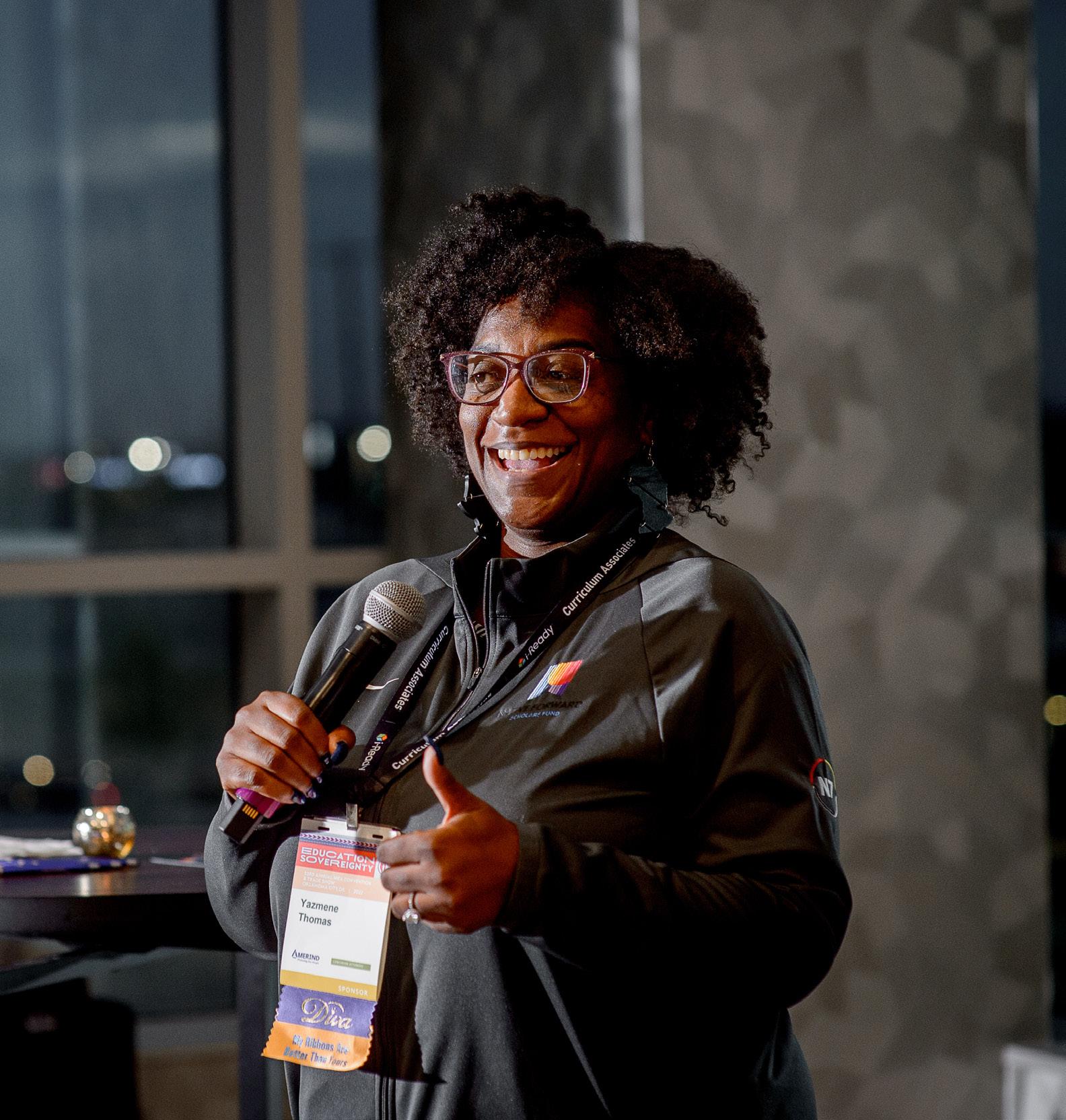
The following are practices and policies that collective communities can work towards to help all Indigenous students in their pursuit for higher education.
Higher Education and Financial Aid:
• Communicate and improve transparency surrounding the actual costs
• Eliminate campus-based data invisibility of Indigenous students
• Expand campus-based tuition and fee waivers
• Deepen understanding and competence of staff around Indigenous student populations and their financial needs
• Offer emergency aid programs
Secondary and Pre-College Education:
• Increase and strengthen financial literacy curricula and pre-college financial planning.
• Improve school data inclusion of Indigenous student data
• Assist Indigenous high school students to explore funding options for their institution of choice
• Expand FAFSA information and planning for families/caregivers and students
• Update training for school personnel
Land Grant Colleges/Universities and Native American Serving NonTribal Institutions:
• Use this report as a benchmark
• Continue developing financial aid programs to fully offset tuition and fees
• Advocate for expanded federal grant programs
For National Non-Native Scholarship Providers:
• Provide expanded aid for nontuition expenses, such as housing, transportation, utilities, etc.
• Evaluate internal organizational and awarding processes for cultural competence and inclusion
• Engage with financial aid offices to ensure that they are providing adequate funding beyond scholarships for addressing the unique needs of Indigenous students without increasing debt
• Advocate nationally for additional investment and expanded eligibility for Pell Grants
• Offer emergency aid programs
• Explore quantitative analytic methods for insuring voice, visibility, and data inclusion for smaller Tribal member representation within national and campus data sets where larger Tribal representation may overshadow within group diversity
To read the full study, please visit our website, www.nativeforward.org
Native Forward alumna and Native Forward's first Student of the Year, Brook Thompson, shares her voice and how it's more than just speaking up. Thompson is from the Yurok and Karuk Tribe and has taken on many roles and positions throughout her journey in higher education. She has experience in private and public sectors to tackling issues from the state and federal level to where she is now, working for her Tribe.
A Gates Millennium Scholar and Stanford University graduate, Thompson is currently working on her Ph.D. at the University of California - Santa Cruz with a thesis focused on how to better integrate Indigenous knowledge into California water policies. Thompson said she merged her public policy and environmental engineering experience because she saw there was a disconnect. "For me, it's kind of just breaking that ground so I can figure out the system and hopefully make it easier and be that role model for my other cousins or the people in the Tribe who want to think about pursuing it," Thompson said.
In 2020, UC Santa Cruz only accepted one Native American student into the entire graduate school program. “I’m the only current Native American in my entire department. I’m the only environmental studies Native American currently at the school and I think that’s really unfortunate, especially for how much environmental studies is building off of TEK (Traditional Ecological Knowledge) work now,” Thompson said.
Despite this, she instills a strong voice that reflects in her academics, career, and how she carries herself in
her personal life. “When you have more Native voices and Native representation in these spaces of academia or just in general, in these previously White majority spaces, it adds a lot to everyone's experience," Thompson said.

She stresses that differing viewpoints can mean everything when it comes to applying for college funding.
“It's so hard, with my friends and with my relatives, they’re thinking like, ‘Oh I’d be so lucky to go to this school and I’d be so fortunate to be able to get in here and get this scholarship,' but for me, I really try to switch that viewpoint. The school would be really lucky to have you,” Thompson said.
Thompson was one of the recipients of the Native American Journalists Associations’ (NAJA) 2022 National Native Media Awards. She placed second in the Professional Division III — Print/ Online Best Environmental Coverage for her story in High Country News, “The Familial Bond Between the Klamath River and the Yurok People.” Thompson writes about her childhood on the river and provides a detailed account of her time there.
The award-winning story highlights the importance of water and its environment for Indigenous people, highlighting the need to keep the Klamath River healthy to continue sustaining those who live on it. “I think you can have a voice and through the fact of just being proud of being Native and how you carry yourself and what you wear is also a part of that voice,” Thompson said.
Native Forward Scholar and Co-Chair of Indigenous Pride LA, Yuè Begay, uses her voice to define who she is. She is of the Nomadic People Clan, born for the Towering House Clan. Her maternal grandfather is of the Black Sheep Clan and her paternal grandfather is of the Near the Water’s Edge Clan. Begay says in this way, she is a Navajo transgender woman.
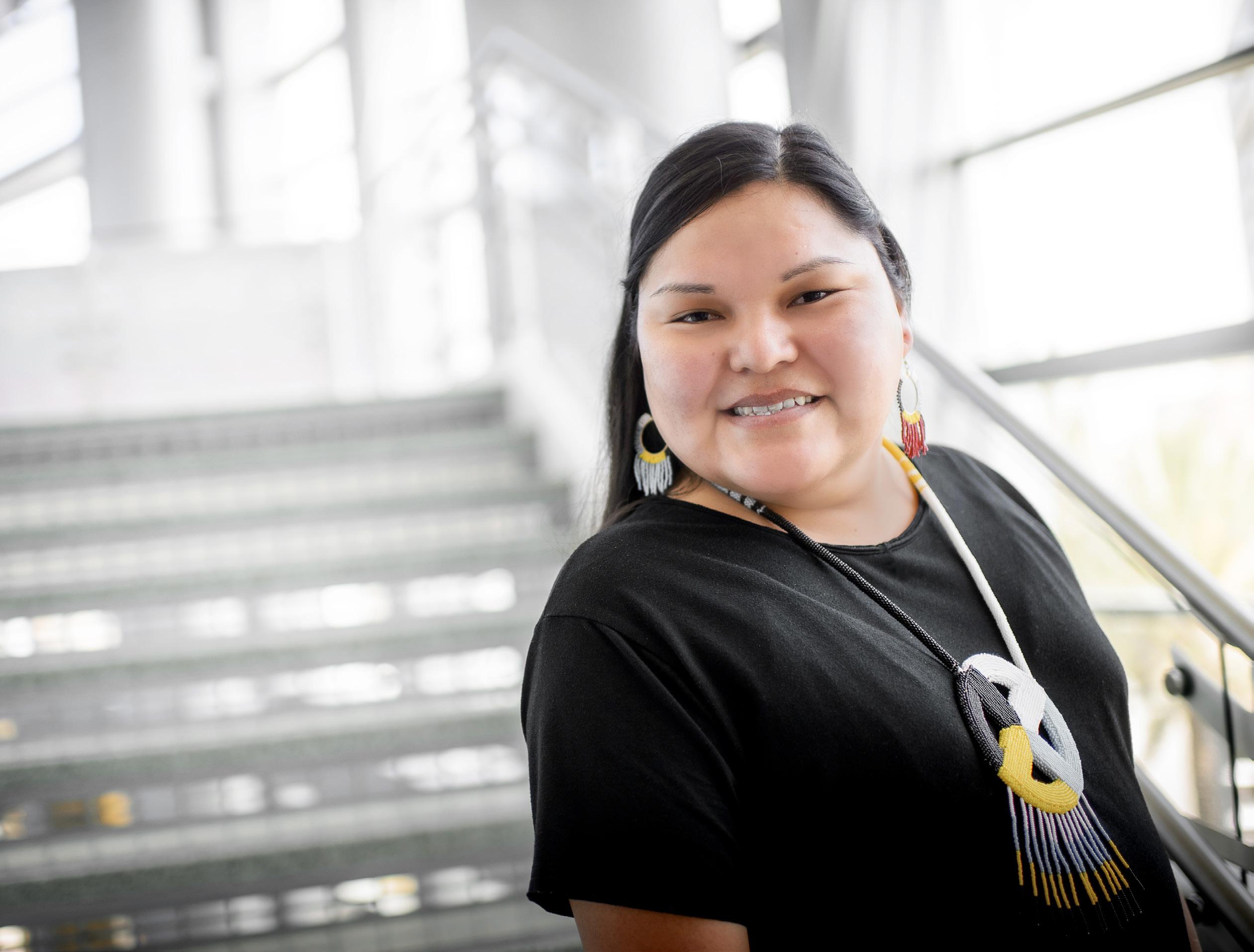
Begay is a recipient of the Gates Millennium Scholarship and graduated from California State University, Long Beach with a bachelor's degree in anthropology with an emphasis on linguistics. She was born in Flagstaff, Arizona, and works in the public health field but also is a freelance graphic artist, website designer, and consultant. "My voice is nádleehí. My voice is Diné (Navajo). My voice is Two Spirit. My voice is trans. My voice matters! When I speak, it is a reminder who I am and where I come from. When I speak, be it in Diné, Bizaad or English, it is to expand the path laid before me by my elders and ancestors for the youth and those yet to come after me. When I speak, I reclaim, decolonize,
and indigenize, all at once. When I speak, I educate because education is medicine. When I speak, even in anger and passion, I speak to rectify and amplify my peoples’ voices. I speak loud and proud because for a long time, I never had a voice and was always talked down to. My words heal, cut, arouse, repel, attract, dismantle, create, innovate, perfect, and captivate. My inner monologue guides my artistry when I create. My spirit strengthens my vocals when I speak for my community. I speak beautifully because I walk in beauty," Begay said.
Lastly, she emphasizes that there are people out there that want to see you succeed. "You have to succeed because many of our elders are leaving us or retiring from critical positions that affect our people. Succeed because you want to, not because you're told to. Higher education is not for everyone. It's okay to take a break or drop out entirely. Returning is also okay. No matter your path, always do it for our people and those like you," Begay said.
Chef Sean Sherman, Oglala Lakota Tribal member from South Dakota, shares how he is using his voice for positive change across Indigenous communities through a traditional Indigenous lens on food system education and culinary dining.
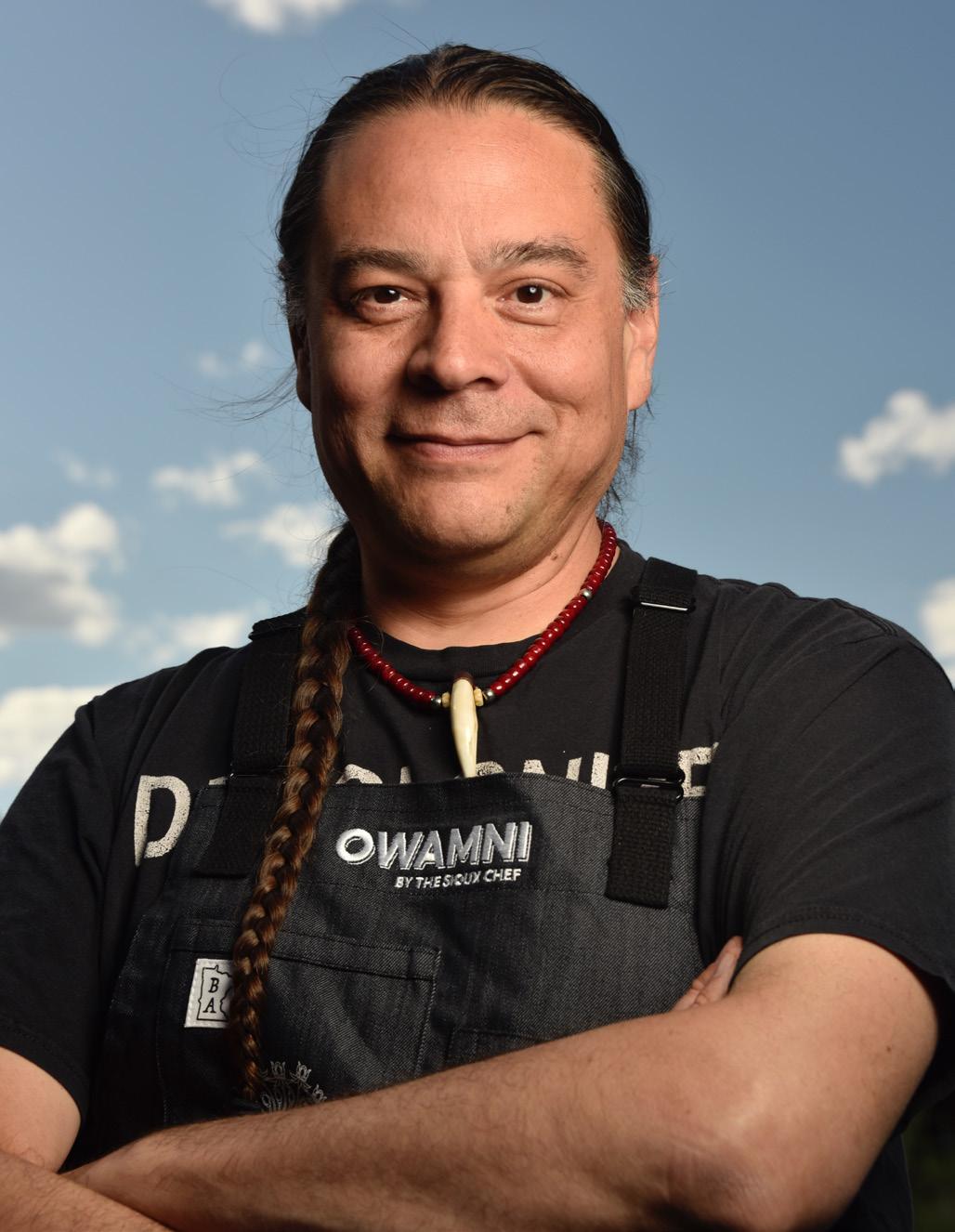
Owner of The Sioux Chef and founder of the nonprofit, North American Traditional Indigenous Foods System (NATIFS), Sherman and his team successfully craft transferable models of traditional Indigenous food models into the modern world.
Chef Sherman revisited the historical shifts that took place in Indigenous populations across North America. During the early 1900s, government commodity foods took space within Tribal reservations introducing an alternative diet than what was previously known. In turn, this shifted the relationships with food and traditional ways of life.
“Food is something that we all have in common as humans, it is such a powerful language to be able to share and create. I feel responsible for creating a platform and using my voice to help others understand the value of Indigenous knowledge globally,” Chef Sherman said.
He reflects on what sparked his passion for food, and the driving force behind his creations focus on reversing colonial damage. Early on in his career, Chef Sherman said he noticed the lack of Indigenous presence in the culinary industry. On a mission to revitalize Native American cuisine and inspired by the foods of his ancestors, he opened The Sioux Chef in 2014 and soon after, founded NATIFS.
At Minnesota-based NATIFS, Chef Sherman and his team work endlessly to shift the spotlight on rebuilding Indigenous food knowledge models through its education and training center, Indigenous Food Lab. The Indigenous Food Lab was built with two principles: to increase access to Indigenous foods and create access to Indigenous food education through classes crafted from Indigenous-based curriculum such as cooking techniques, gardening, seed saving, and Indigenous plant identification, he said.
The team at The Sioux Chef plan to extend the Indigenous Food Lab to communities beyond Minnesota after seeing an increase in interest. The Sioux Chef is a prime leader in reclamation of ancestral education. “Find your purpose, create goals, and find ways to implement more Indigenous values into everything you
do - continue to push Indigenous values forward,” Chef Sherman said.
He says adaptability is something Natives have always been able to confront. For Indigenous nations, obstacles arise as the world continues to alter, pushing communities to find effective alternatives to maintain traditions. The injustices of politics, climate change, and access to land and water drive the NATIFS team to continue their work on finding new strategies to keep traditional food knowledge alive.
For Chef Sherman, food gives him the ability to create a toolkit for the next generation. “For me, it was first identifying what our Indigenous foods of North America were and then trying to create a philosophy on how we move forward in a modern world,” he said, "To understand food systems is to study the source of plants and seeds that are native to the area in its entirety."
When The Sioux Chef prepares dishes, they consult local farmers who still harvest native plants, fusing tradition in all dishes. From earth to plate, Chef Sherman uses his voice and craft to reconnect the community with healthy, earth-based habits. He says he hopes Indigenous communities find an outlet to reconnect with traditional food systems in order to keep culinary practices alive.
Chef Sherman was recently named one of the country's 100 Most Influential People of 2023 by Time Magazine.
Native Forward Alumna and Co-Founder of Poptronic, Chatnie Herne, is making impacts for Native women entrepreneurs in the tech industry. A member of the St. Regis Mohawk Tribe and a recipient of the Science Post Graduate Scholarship Fund for the 2021-2022 academic year, Herne graduated with distinction last May with a master’s degree in IT management.
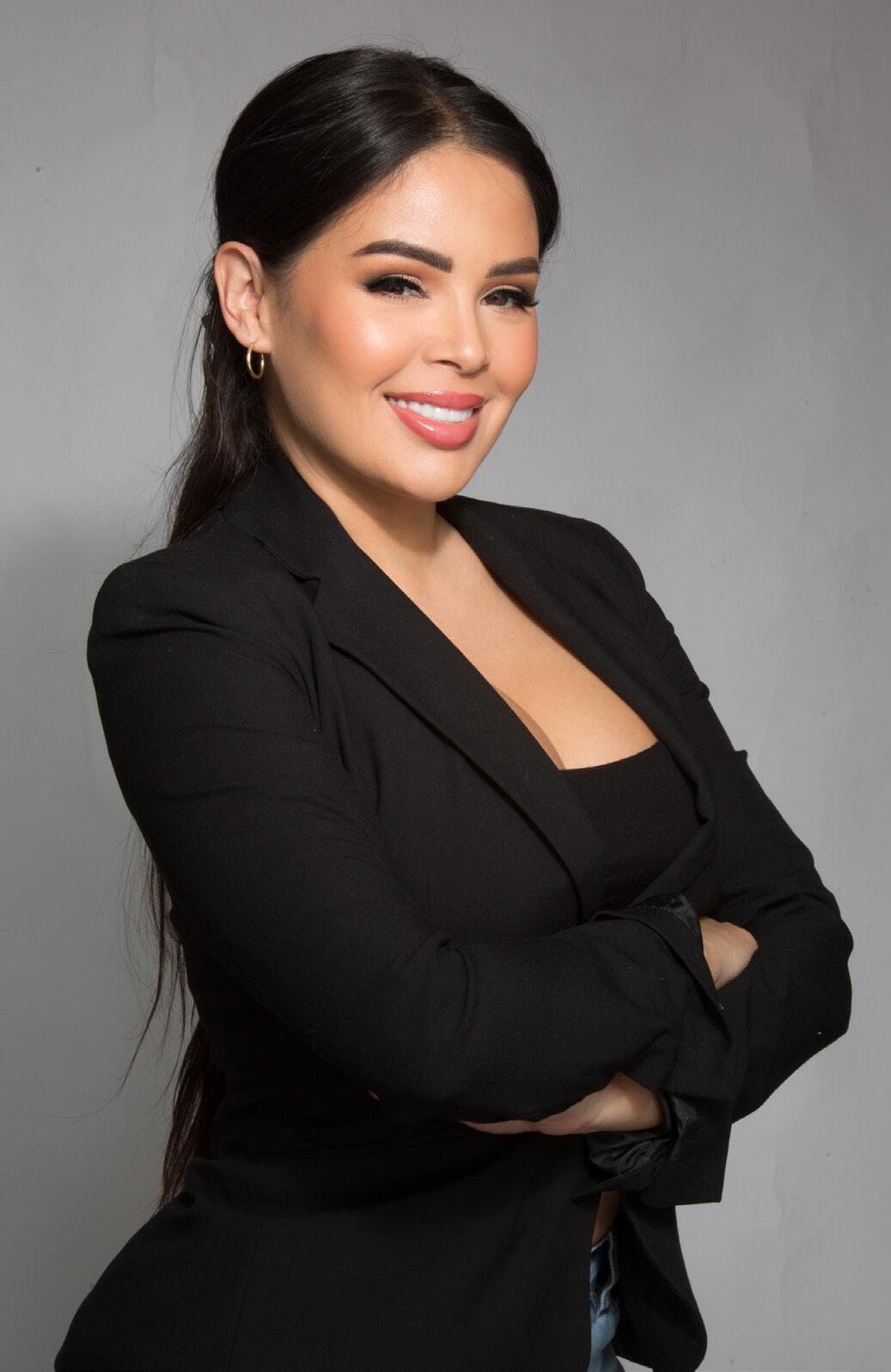
Herne credits her graduate distinction to her scholarship because it took the stress off the financial aspect of college "If I didn’t have that help and ability to put all my energy into school, I wouldn’t of [sic] probably graduated at the level that I wanted to,” Herne said.
During the last semester of college, she, along with her business partner Kelly Bergeron, founded Poptronic, a startup that specializes in tech hardware rentals. Herne said the idea was in response to the COVID-19 pandemic with a goal of increasing the quality of life for people. “Tech hardware is extremely expensive, and coming from a reserve and being right next to my hometown, Akwesasne, we see that lack of accessibility in tech,” Herne said.
Poptronic wanted to address the rate of tech consumption while also promoting sustainability. Herne said technology is moving so fast that they wanted to address the climate issues associated with it. She says she takes pride knowing she's making an impact in the field of STEM. “In terms of voices, I’m really big on visibility. There’s not a lot of females in STEM education or careers or tech start-ups, and even less, there’s not a lot of Indigenous females,” Herne said.
She says women must work harder and know more and be considered experts in the tech field. Growing up on a reserve speaks to Herne and she says there are a lot
more barriers for young Native people who want to get an education and it's all about finding those resources. “There’s resources out there. Look for them, reach out, ask questions. There’s no such thing as a stupid question, ever. There’s people out there that want to help you,” Herne said.
She said finding a mentor is important, no matter what your reason is. "We have this responsibility as Native Americans who are not really well represented, so if we’re in that space, I think we all have a personal responsibility to create that visibility,” Herne said.
Dagot’ee, I am Kimberly Begolin from Whiteriver, Arizona, a Tribal member of the White Mountain Apache Tribe and a Native Forward scholar. I have five children and am the oldest of nine siblings. I was accepted into a doctoral program, studying organizational leadership with an emphasis on K-12 leadership at Grand Canyon University (GCU). I completed my Master of Arts in Communication, emphasizing Education, in April 2022, at GCU. I have a Bachelor of Science in Public Administration from Northern Arizona University, a Business Administration degree from Northland Pioneer College in Whiteriver, Arizona, and a degree in business administration from Southwestern Indian Polytechnic Institute in Albuquerque, New Mexico.
Kimberly BegolinI am the first in my family to graduate from higher education and the first to pursue a doctorate. Education has always been important to me growing up. I was always involved in school activities, holding various student council positions throughout middle and high school. I was also an honor student throughout elementary, middle, and high school years. In college, I was also involved in school activities and on-campus clubs. Living on the reservation most of my life, I didn't have much growing up. My parents had me at a young age and took responsibility at an early age. My parents tried their best to make ends meet. My father didn't complete high school but sought employment and focused on providing for his family. My mother finished high school, sought work, and earned her associate degree two years later.
Our grandmothers raised my siblings and me from my father’s side while my parents worked. There were four children then, and in 1998, we lost our father to liver cirrhosis. My mother later remarried and had five more children. Growing up, I never thought we were poor if we had a roof over our heads and were clothed and fed. I never really enjoyed my elementary years because kids were cruel and would make fun of me because of how I dressed and how smart I was. High school was the most challenging year of my life because I was a sophomore when my dad left this world, which changed everything.
I teach at the Alchesay High School with the Whiteriver Unified School District, teaching English to mainly Apache children who reside on the reservation. I am grateful to have this opportunity to be among the
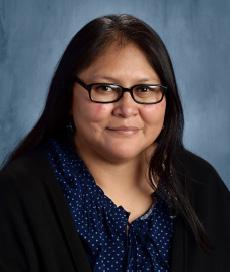
Native youth, encouraging them to think about their future. As an alumna of Alchesay High, I can share my story and encourage students to think about setting goals and look beyond high school. I think it’s important to remind students who they are and where they come from. I want students to know they have a lot of choices and several resources that can benefit them in any career they choose. Living on the reservation can be difficult, and many people live in poverty, and we deal with many different types of stress and obstacles.
There are many things I would like to develop to help our youth today. I would like to see a recreational facility open, and my community needs parks, buildings, services, and activities for youth. I want to coordinate a program with schools, Tribal departments, rehabilitation centers, or any organization that will help create extracurricular activities for youth on the reservation. It’s important to me to build relationships with the youth, strengthen their mindset, and, more importantly, provide resources that will benefit their future goals. Because of the lack of after-school activities, many students are leaning on drugs and alcohol, and many don’t want to go to school or college or even finish high school. I believe today's youth crave something to do, so why not teach them new skills, how to sew, archery, bake, cook traditional food, carpentry, beading, camp dressmaking, or fishing? I want to be the voice for our youth. I want to find the gaps while also finding ways to reconnect teachings, be engaged in teaching lessons, and create hands-on activities to increase students' sense of belonging to reconnect them to who they are and where they come from.
Having a voice means living through challenges and overcoming them. I had to go through my obstacles to become a better person. I continued pushing myself to be a role model for my children and students, hoping they would continue their education. My children and family had seen me at my lowest, but I never quit. I want to be Dr. Begolin, and it’s up to me to make it happen. The field of education excites me; I love what I do and learning new things; I get to learn something new every day; nothing is ever the same. My advice to Native students is never to give up; never be afraid to try new things. If you fail, get back up, start over, and try a different approach. You are the next future.
Arlin is the Mentoring Program Manager at Native Forward Scholars Fund. She grew up on the Navajo Hopi border and “college” was one of the few English words her grandparents could say. At a young age, the Navajo-Hopi Land Settlement Act of 1974 encouraged her parents to make the decision to relocate to the opposite side of the Navajo reservation. Her mother hoped for college opportunities for her children and herself. Arlin started college as a first-generation student and then watched her mother cross the stage to attain her bachelor’s degree in her sophomore year of college.
For many students, a college degree comes with a story and a journey of obstacles and victories. As the Mentoring Program Manager at Native Forward, Arlin has had the honor of hearing the journey of each scholar coming into the Rising Native Graduates program. She connects undergraduate scholars with a coach who is pursuing a graduate degree, or has attained a graduate degree, to help guide scholars in their graduate school pursuits.
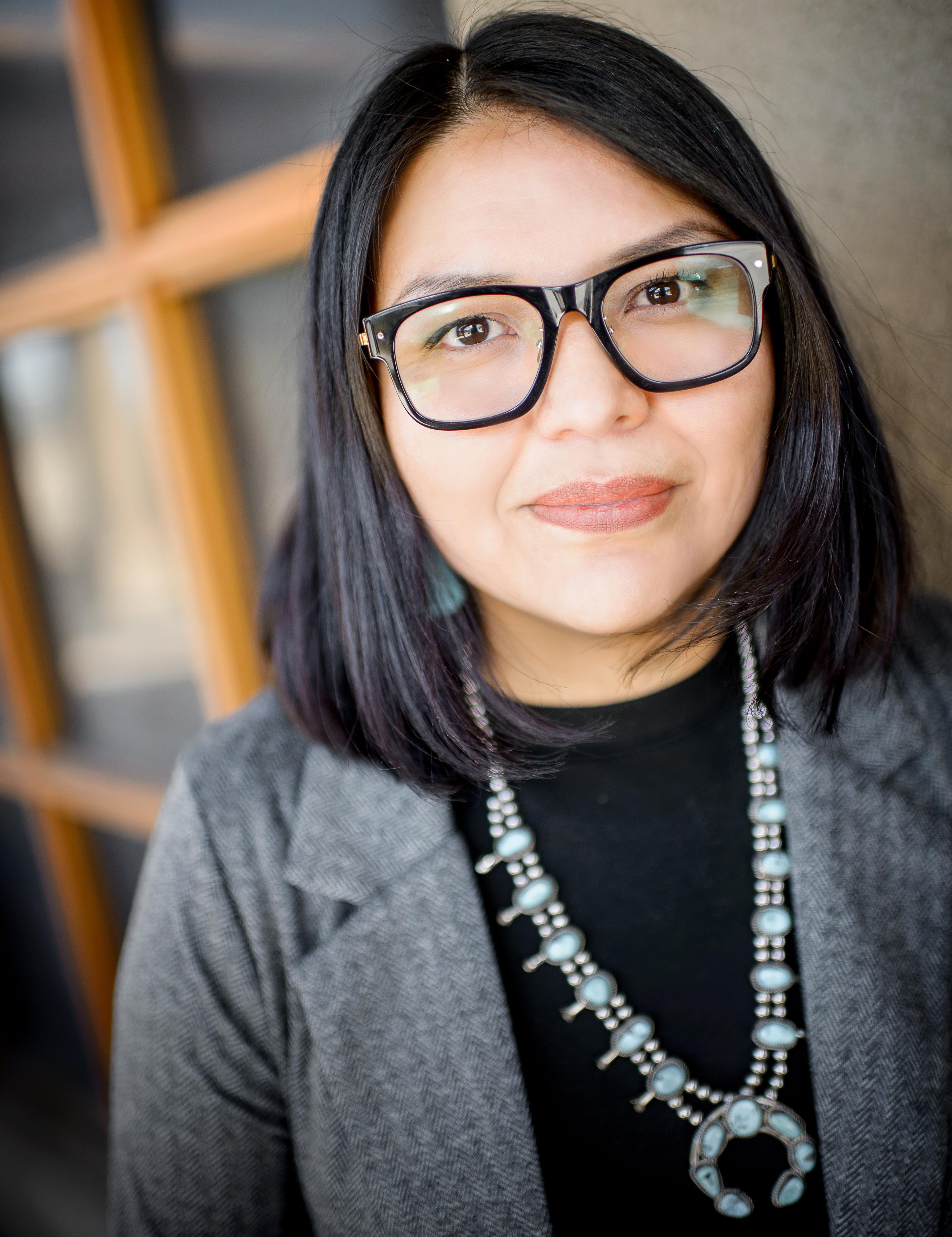
Arlin has been in college access and success for over seven years. Throughout her professional experience, she has seen many students leave their local communities and support systems to pursue a college education in a different state. Much of her work happened with Hispanic communities in Arizona and
Texas. Since starting with Native Forward, she has seen scholars and coaches continue to do the same.
Rising Native Graduates has impactful and powerful scholar stories of Native students starting their first day of graduate school. A recent undergraduate scholar applied to three separate graduate programs and was accepted into each program. He made the final decision to attend a program within the same state he lived in. With the guidance of Native Forward staff, he applied for a summer internship and was accepted.
Weeks after starting his internship, we got to hear about how he fell in love with the land and the people thousands of miles away from where he called home. Soon after, he was applying for another graduate program and was accepted. Now as staff, we get to see him at conferences, and we get to hear his stories of his graduate program and how he plans to give back to the Native Forward community by becoming a mentor.
The biggest reward of being a Mentoring Program Manager is the relationships being built and the community. We have a network of individuals open and willing to provide advice, support, and guidance for undergraduate scholars through their educational endeavors. We are here to provide a path for our future Native leaders and lead the path forward.
We are Native Forward.

Pete is an undergraduate senior at Columbia University majoring in Political Science and Ethnicity & Race Studies with a specialization in Native American and Indigenous studies. She is the President of the Native American Council, an intern in undergraduate admissions, co-chair for the Columbia Mentoring Intuitive, and recruitment liaison for Indigenous student housing. She also works in curating posts for grassroots and intersectional organizing groups.
Nome Eskimo Community
Evans attends Texas Lutheran University where she is pursuing a Bachelor of Science in Nursing. Karis interned in the Land Department for her Alaska Native Corporation and was a land assistant at Sitnasuak for the summer where she worked alongside the Land and Resources Administrator, Charles Ellannato, to inform shareholders and nonshareholders about policy updates. She also helped conduct field inspections and marked out campsites and homesites.
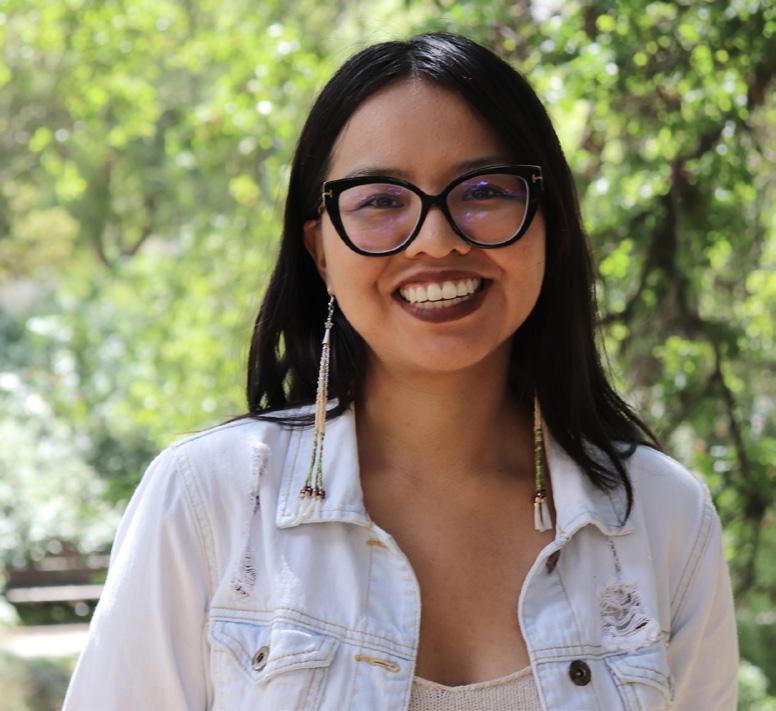
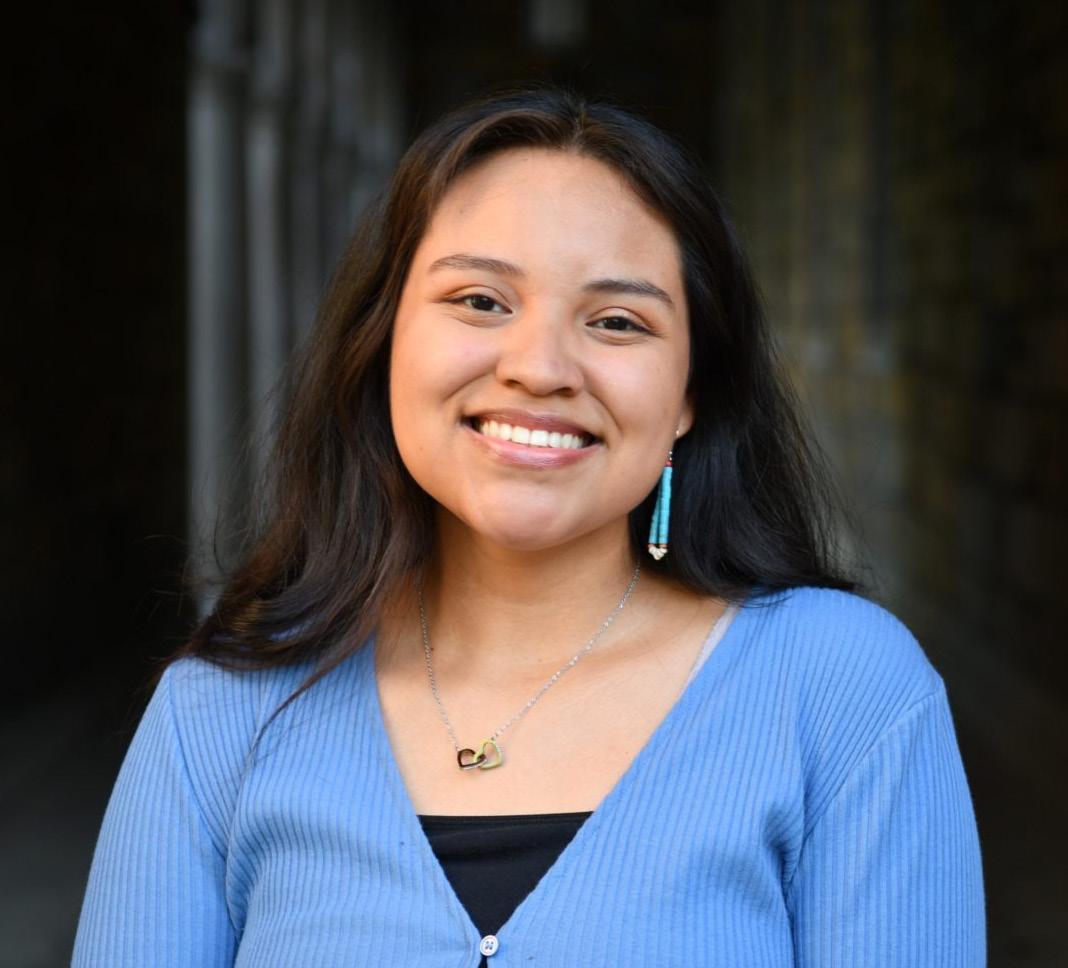

Yazzie is a Ph.D. candidate at the University of California, Davis in the Native American Studies Department and also earning a Designated Emphasis in Feminist Theory and Research. She attended Diné College in Arizona. After earning an associate degree in Diné Studies, she graduated with honors with a bachelor’s in Native American and Indigenous Studies at Fort Lewis College in Colorado. In 2021, she earned her master’s degree in Native American Studies at the UC Davis.
Kakiley attends Northeastern State University and will be graduating in December with a master’s degree in leadership. She has worked for her Tribe for two years as a scholarship advisor. It has been a dream job for Workman to work with Native students to help bridge the gap between high school and higher education. She spends her free time with Cherokee Nation Medicine Keepers to revive medicinal knowledge within local communities while learning her native language.
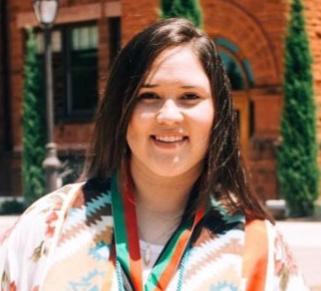
Shannon graduated from East Fork Lutheran High School and earned her Associate of Arts degree from Northland Pioneer College. She attends the University of Arizona (Bachelor of Science degree in Natural Resources) and Tohono O’odham Community College, where she will receive her Associate of Science and Certificate in Geographic Information Systems (GIS) this year.
Cronin earned her baccalaureate of Environmental Science degree from Haskell Indian Nations University in May 2015. As an Alfred P. Sloan Indigenous Graduate Partnership Scholar, she earned her Master of Science degree in both Ecological Sciences & Engineering and Curriculum Studies & Instruction at Purdue University in May 2018. Cronin returned to Purdue University to pursue her Ph.D. in the same departments and is a George Washington Carver Fellow and Alfred P. Sloan Indigenous Graduate Partnership Scholar.

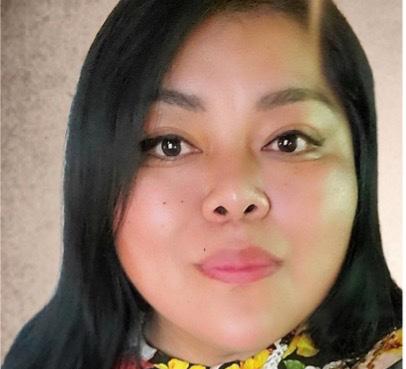
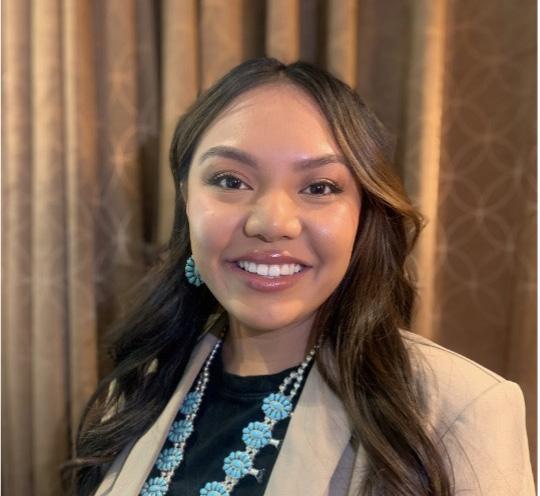
Navajo Nation
Edgewater is pursuing a Bachelor of Science Degree in Environmental Engineering at Arizona State University (ASU). She is an advocate for Native American students in the STEM field and shows her support by representing the states of Arizona, New Mexico, Utah, and Colorado as the American Indian Science and Engineering Society Region 3 Student Representative. After graduation, she intends on returning to the reservation to apply engineering fundamentals that relate to environmental conservation and stability.
Choctaw Nation of Oklahoma
Dodd graduated with his Bachelor of Arts degree with a major in Political Science and a minor in History from Midwestern State University. He is a student at Oklahoma City University School of Law working to obtain his Juris Doctorate and become an attorney. He wants to use his degree to ensure laws are applied fairly and evenly, and when they are not, he wants to step in and stand up for those who cannot.

Lopez is majoring in Ethnic Studies with a minor in Indigenous Studies at Colorado State University. She says her goal is to have a career as an educator and make an impact for underserved students while supporting and uplifting them into higher education. Lopez is passionate about serving others and making a difference in her community. She also says she wants to be a positive role model for her children, family, and community.
Hansen-Vann is a tutoring and careers coordinator for TRIO Student Support Services, an academic support program designed to increase the academic performance, retention rates and graduation rates, at Northeastern State University in Tahlequah, Oklahoma. She received a bachelor’s degree from Oklahoma Baptist, a master’s degree from Northeastern State, and is currently working on a Ph.D. in Higher Education at the University of Arkansas.
Reece is a nontraditional undergraduate student at the University of Alaska Fairbanks (UAF) studying Biological Sciences as a Biomedical Learning and Student Training (BLaST) Scholar. Her experience in the Biological Sciences began in January 2022 in support of the BLaST Undergraduate Research Experience Program at UAF, while she was finishing up her associate degree in Allied Health at I isaġvik College. Reece said she was chosen to work in the Ichthyology and Genetics Laboratory alongside her mentor.

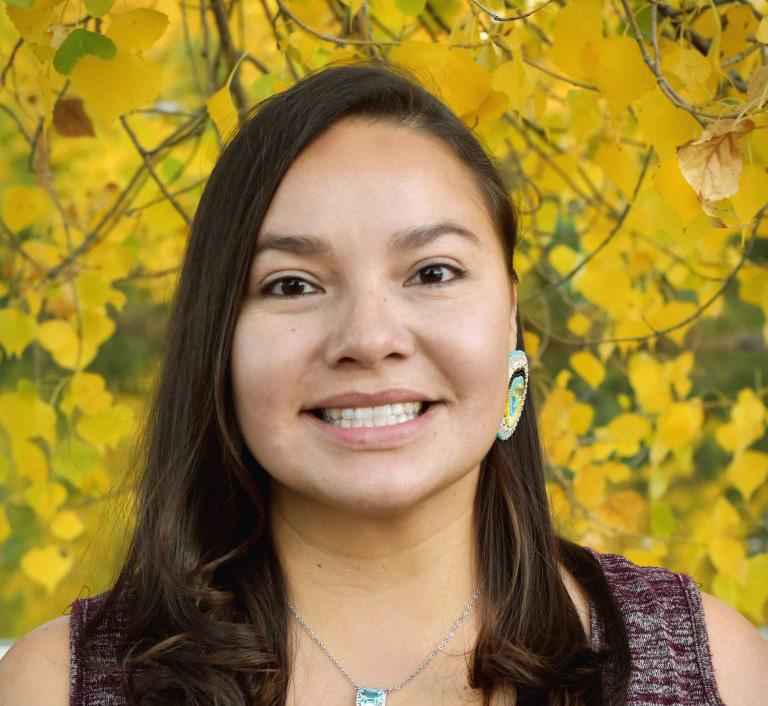

Horton is a third-year medical student at Albert Einstein College of Medicine in Bronx, New York. She graduated from Lipscomb University Summa Cum Laude with a Bachelor of Science degree in biochemistry in 2020. While at Lipscomb, she participated in multiple medical service trips to Guatemala and two service trips to Panama. Horton is passionate about health equity, mental health, and justice reform and will be applying to psychiatry residency programs this fall.
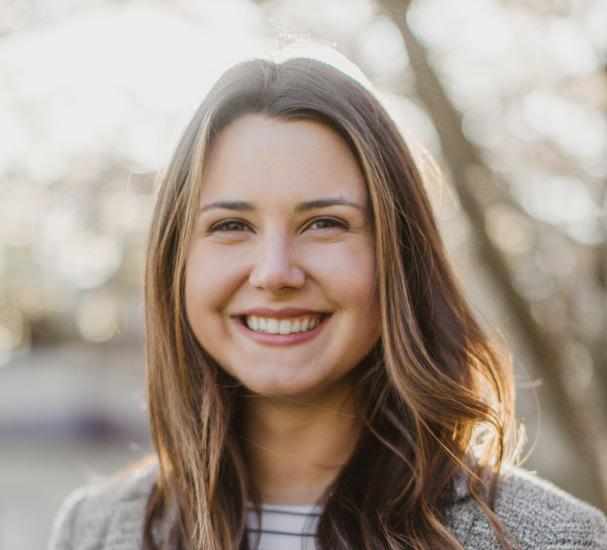
Native Forward Scholars Fund held a session at the SXSW EDU 2023 in Austin, Texas. Native Forward's Chief Executive Officer Angelique Albert and Activist and Alumna Dr. Henrietta Mann presented, Culture Change: Transforming Native Higher-Ed. The session examined the legacy and intergenerational impacts the Federal Indian Boarding School Era had on Native communities and the effects that are still seen today. Dr. Mann, one of the United States’ foremost leaders of Native American studies, offered thoughtprovoking conversation on how we can transform higher education in support of Native scholars.
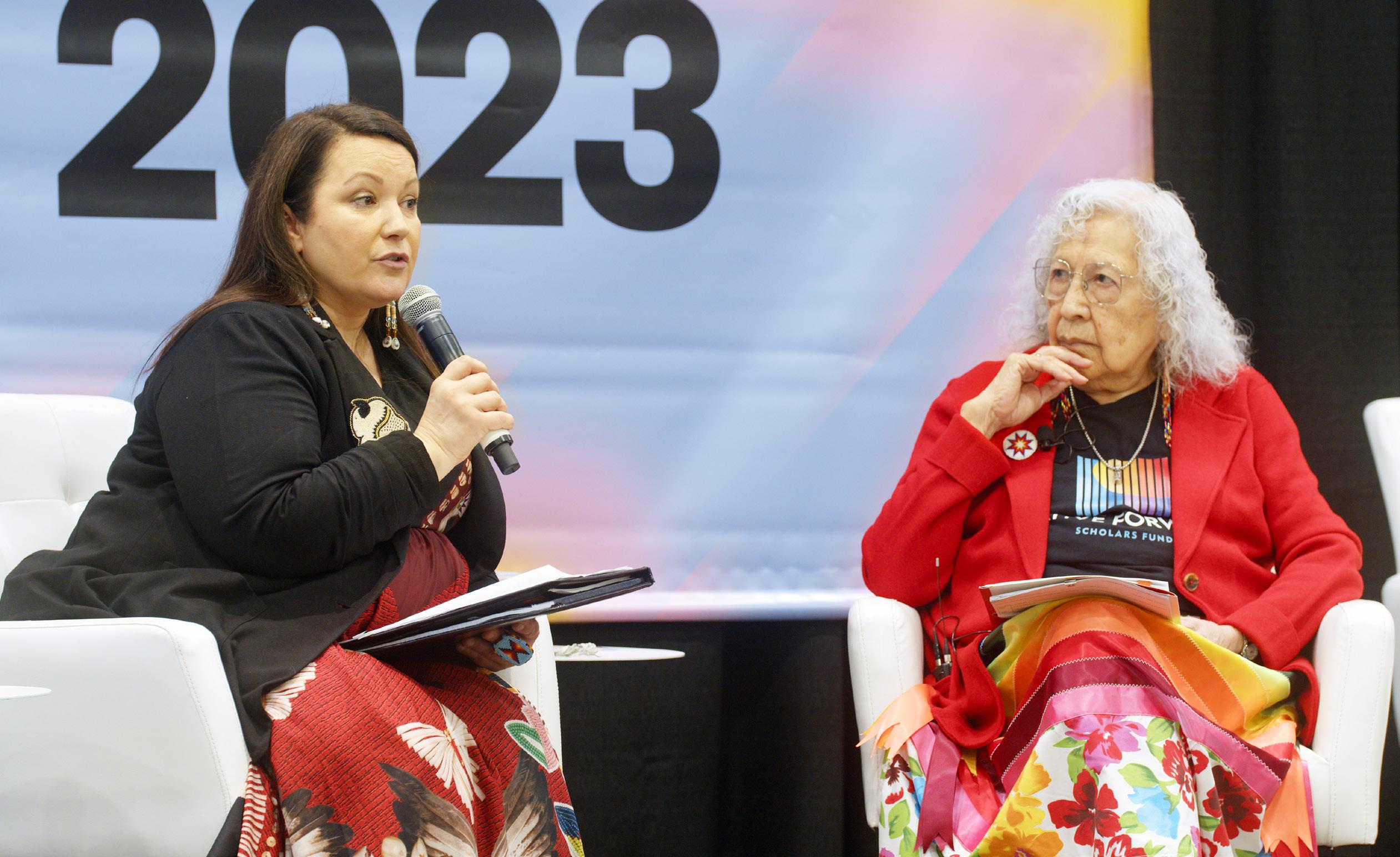
“The people that are so invisible are the people that are most economical deprived. The peoples whose educational history has included a lot of violence are still here,” Dr. Mann said. Tribes that are recognized on a federal level are sometimes overlooked and she touches on the point of who is it to say if we are Indigenous. Dr. Mann says that is what she taught in her classrooms during her career in universities across the nation.
Albert says the legacy and impacts of the Boarding School Era effects how higher education, foundations, and allies can partner to intentionally serve Native students. She points out the racial awakening happening in the country and awareness about that time is finally coming to light.
Native Forward Chief Executive Officer Angelique Albert (Confederated Salish & Kootenai Tribes) and Native Forward Alumna, Activist, and Academic, Dr. Henrietta Mann (Cheyenne—Arapaho Tribes of Oklahoma), speak on a panel, Cultural Change: Transforming Native Higher Ed, at SXSW EDU 2023 Conference in Austin, Texas, at the Austin Convention Center on March 8, 2023.Meanwhile, Dr. Mann reflected on her connections to the Boarding School Era saying the federal government decided that it would be cheaper to educate Indigenous peoples of this land, than it would be to exterminate them.
“There would be some light-skinned, fair-haired people that would come among us from the direction on which the sun rises, and they would bring different ways with them. They would bring a long stick that speaks with the voice of thunder. They would bring something that looked like sand but tastes very sweet.’ He said that these people would want the land – our land, which is our grandmother and that they would take it. And finally, he said, ‘they will ask you for your children to educate and you must say no. Because those they take to educate, will not know anything about who they are in terms of this land’s first people,’” Dr. Mann said, reflecting on Indian Education as it related to the Federal Indian Board School systems as told to her by a Cheyenne man many years ago.
Albert shared personal and family connections to boarding schools saying her grandfather, who spoke fluent Salish and Kootenai, refused to speak his own languages after coming out of boarding school. “With that Boarding School Era, their philosophy and tag line was ‘kill the Indian, save the man,’ and so it was about stripping us of our cultural ways and the language,” Albert said.
Albert says because of boarding schools and the impact it had on her family, she had to learn her language from
other elders in her community. She also discussed a different view of the impact. “As we were going through the Boarding School Era, there were some pretty phenomenal people who had the foresight to say, 'we as Native people deserve a true education,'” Albert said.
The session went on to cover higher education’s role in disrupting the weaponization of education on Native people, ensuring it gets disrupted. Education is a way out of poverty, and education is a way of learning to “live in one ecosystem, one world in an ocean of relations,” Dr. Mann said. “We’re all human made up of the same physical body parts, the only thing that’s different is the color of our skin. So, education is necessary for our young people to be able to live and work alongside everybody else’s children and enjoy what we might call a good life.”
Dr. Mann said there were 60 million buffalo at one point in the country that provided a way of life. Buffalo represented good life and abundance, a life where you didn’t face starvation and a life that gave food and clothing, she said.
“Today there are many of our ancestors that view education as the “new buffalo.” People today are looking at education as representative of all that is good about life; and education is that,” Dr. Mann said.
If you would like to listen to the full SXSW EDU session, please visit our website at www.nativeforward.org.
 Native Forward Alumna, Activist, and Academic, Dr. Henrietta Mann (Cheyenne—Arapaho Tribes of Oklahoma) speaking on a panel, Cultural Change: Transforming Native Higher Ed, at SXSW EDU 2023 Conference in Austin, Texas, at the Austin Convention Center on March 8, 2023.
Native Forward Alumna, Activist, and Academic, Dr. Henrietta Mann (Cheyenne—Arapaho Tribes of Oklahoma) speaking on a panel, Cultural Change: Transforming Native Higher Ed, at SXSW EDU 2023 Conference in Austin, Texas, at the Austin Convention Center on March 8, 2023.
Accenture
American Indian Science and Engineering Society
American Indigenous Business Leaders
American Indian College Fund
AMERIND Risk
APIA Scholars
Bank of America
Big Fire Law
Bill & Melinda Gates Foundation
Blue Stone Strategy Group
Bureau of Indian Education
Catena Foundation
CBRE
CLA Foundation
CNIGA
Colorado University Upward Bound
Contact Us
Cypress Creek
Edelman
FoodCorps
Hewlett-Packard
Hispanic Scholarship Fund
Indigenous Education Inc
Johnson Scholarship Foundation
Lincoln Institute of Land Policy
MetLife
Murdock Charitable Trust
NDN Collective
NextEra Energy
NIKE
NIKE N7
Northwestern University
PNM
Mailing List | Sign up at www.nativeforward.org/our-magazine
Poarch Band of Creek Indians
REDW LLC
Rincon Band of Luiseño Indians
Salish Kootenai College
Sandia National Laboratories
San Manuel Band of Mission Indians
Salesforce
Shakopee Mdewakanton Sioux Community
Sogorea Te’ Land Trust
Society of Professional Engineering Employees in Aerospace
UNCF
United National Indian Tribal Youth Inc.
Urban Native Era
Wells Fargo
Advertising | For advertisement inquiries, please send an email to: Marketing@NativeForward.org.
Reprints and Permissions | Reprints of published articles and/or artwork are prohibited without permission of Native Forward Scholars Fund.
Native Forward Scholars Fund 10010 Indian School Rd. NE, Albuquerque, NM 87112 Phone: 800.628.1920 | Fax: 505.884.0427
NativeForward.org
TARGETED READERSHIP
Over 33,000 American Indian and Alaska Native students, graduates, professionals, and organizations.
EXTENSIVE IMPACT
• Reach Native leaders
• Recruit Native students
• Hire Native employees
• Develop business in Indian Country
• Support our mission
FALL ISSUE: SEPTEMBER 1, 2023
ADVERTISING CONTACT
SUBSCRIBE TO OUR DIGITAL MAGAZINE

If you would like to place an ad in the American Indian Graduate, please email marketing@nativeforward.org.

Advertisers and ad agencies assume full liability for all content of their ad including text, representations, and illustrations of ads printed. Advertisers also assume full responsibility for all claims made against Native Forward Scholars Fund that may arise for their ad(s). The publisher reserves the right to reject any advertisement not in keeping with Native Forward Scholars Fund standards. All copy is subject to Native Forward Scholars Fund approval.
